How to Begin Your Self-Discovery Journey: 16 Best Questions

As part of this process, we must not only search to determine what constitutes our true selves, but let go of objects of identification we’ve long mistaken for ourselves, requiring a balance of introspection and new experiences.
So let’s set sail.
In this article, we’ll give you a range of powerful questions to help you along your journey of self-discovery and point you toward further reading and resources.
Before you continue, you might like to download our three Meaning and Valued Living Exercises for free . These creative, science-based exercises will help you learn more about your values, motivations, and goals and will give you the tools to inspire a sense of meaning in the lives of your clients, students, or employees.

This Article Contains:
What is self-discovery according to psychology, fostering self-discovery skills: 10 examples & tips, why is the process important, a look at self-discovery coaching, 3 exercises, games, and activities for adults, best worksheets and journal prompts, 16 questions to ask yourself or your clients, helpful books & apps for your journey, tools from positivepsychology.com, a take-home message.
Drawing often from the field of philosophy , psychologists point to the illumination of our daimon (or ‘true self’) as the ultimate goal of self-discovery.
Formally defined, this true self is
“the central inner force common to all human beings and yet unique to each, which is the deep source of growth… [that is] free, healthy development in accordance with the potentials of one’s generic and individual nature.”
Horney, 1950, p. 17
As part of the process of searching for our true selves, we are ultimately working to identify three things (Waterman, 2011):
- Personal potentials
- Our purposes for living
- Opportunities to act upon those potentials and purposes in living
The search for our true selves, therefore:
“refers to those processes, both intuitive and reasoned, by which those [personal, purpose-related] potentials are discovered and come to attain the status of personally concordant goals that are to be actualized.”
Waterman, 2011, p. 360
According to this view, a person’s true self essentially lies beneath the surface, and our task is to find, recognize, or understand that which already exists. Once you have, you can then make choices about your life and identity that are more consistent with this self-knowledge (Waterman, 2011).

Seek a supportive atmosphere
The more time we spend in the presence of supportive family, friends, lovers, and communities , the sooner we will be likely to discover our true nature. This is because warm and encouraging atmospheres facilitate feelings of inner security while providing the freedom to have our own feelings and thoughts (Horney, 1950).
To this end, here are some ideas to consider:
- Seek quiet spaces and time out to facilitate reflection or journaling .
- Join a social group whose interests and passions align with your own, such as a painting, writing, or poetry group.
- Find a coach or therapist for a safe space to pursue self-discovery.
- Set boundaries with people who discourage your individuality, negatively affect your emotions, or put you down.
- Seek the company of people who inspire you, make you feel positive, and challenge your perception of yourself.
Identify your drifts
Pay close attention to the things you naturally love doing, or drifts, particularly those that are personally expressive . By paying attention to the subconscious pull of these activities, you can allow them to guide you toward your true self, stemming from your genetic makeup, upbringing, and experiences (Pagedar, 2021).
- Our drifts tend to emerge when the mind is still, so try selecting a quiet day to do some meditation or practice some relaxation techniques.
- Try to notice activities that cause you to slip into the state of flow , as these often point us toward our drifts.
- Consider which activities you possess a natural aptitude or talent for, perhaps using a strengths-finding exercise .
- Think about which activities you find intrinsically motivating . These are the activities you would undertake in the absence of external rewards, such as money or the approval of others.
- Notice times when you feel a strong sense of personal responsibility to do something or have a unique vision about how something should be carried out.

Download 3 Meaning & Valued Living Exercises (PDF)
These detailed, science-based exercises will equip you or your clients with tools to find meaning in life help and pursue directions that are in alignment with values.
Download 3 Free Meaning Tools Pack (PDF)
By filling out your name and email address below.
To understand why self-discovery is so important, we must consider the consequences of failing to identify our true selves.
According to Horney (1950), when a person experiences a large discrepancy between their lived and real selves, they are likely to experience a sense of alienation from themselves. This remains true even if the person is successful in their activities and receives external rewards.
Such a person may often notice themselves wondering, “ Why am I doing this when it’s not who I really am? ” The consequence is a feeling of guilt or dissatisfaction if we fail to live up to an idealized version of ourselves that we cannot be.
Besides this negative emotional toll, the problem with pursuing such an ideal is that it will be rooted in externally derived standards of worth.
To illustrate, here are some examples:
- A student feels pressure from their parents to pursue a prestigious career in law, even though this line of work does not inspire them.
- A famous musician has mistaken their true self with their like of the status, prestige, and social validation they receive while performing.
- A woman’s family talks her into finding a husband and settling down when she’d rather travel the world with her friends.
- A son feels obligated to take over the family business when he’d prefer to start his own venture.
When we cannot live in alignment with our true selves, we must spend energy attempting to deny and distort our experiences to make sense of a pervasive lack of happiness and personal fulfillment. This ongoing effort can go so far as to produce psychological states and conditions such as depression (Waterman et al., 2010).
This is why self-discovery is so important.
Our goal in life should not be to pursue imagined or externally derived ideals, but rather to develop a more realistic understanding of our strengths and limitations. By doing so, we can avoid negative psychological states and self-actualize , feel contentment, and make better contributions to the world.

A growing trend in coaching, self-discovery coaching is about looking beyond specific goal pursuits (e.g., “I want to improve my self-esteem ”) to discover how we can live authentically and be truly happy .
Self-discovery coaching has many components, including (Elevate Life Project, n.d.):
- Exploring your values to live in congruence with what’s most important to you
- Discovering grounded confidence, centeredness, and strength
- Identifying your abilities for making easier decisions
The role of a self-discovery coach in this process is to act as co-pilot on a client’s journey toward authentic fulfillment by challenging them, imbuing them with courage, and showing compassion.
If you or your clients are looking to set off on a self-discovery journey, consider the following fun and insightful activities to get you started.
This exercise is a useful starting point for viewing yourself clearly in terms of values, beliefs, and more. The exercise guides users through a two-step process of considering themselves from the perspective of others, followed by a consideration of their self-perceptions at different times in their life.
Spontaneous collage
Collage is a fun and cathartic method of self-discovery that helps people bypass the socially protective aspects of the mind and reveal aspects of their authentic self. Best of all, no previous art experience is required.
For a great resource, check out Shelley Klammer’s 12-week online course and check out the #collageforselfdiscovery hashtag on Instagram to get inspired by others’ collages.
Kokology: The Game of Self-Discovery
Created by famous Japanese psychologists Tadahiko Nagao and Isamu Saito, kokology , the study of kokoro (“mind” or “spirit” in Japanese), is a fun and sometimes hilarious game for learning about yourself.
The game invites players to answer questions about seemingly innocent topics, such as the color of an imaginary bird that has flown in their window, to reveal profound insights in their answers.

Journaling and worksheets can both be hugely helpful for this purpose.
To help, look at some of the following free resources from our site:
- Self-Awareness Worksheet for Adults This worksheet poses a series of 15 questions to help you discover more about your true self. Specifically, the questions tap into topics such as your talents/strengths, values, and barriers to living more authentically.
- What Are My Qualities and Traits? This worksheet invites you to identify your top five and weakest two qualities from a list of 100 strengths. It then invites you to consider how you might shape, develop, and use your toolkit of identified strengths to better your life.
- Reflecting on Three Things This worksheet invites you to explore what defines who you are. These reflections can include statements, objects, roles in life, people you admire, and ambitions.
If you’re more into journaling, see if any of the following prompts might inspire some of your upcoming entries (Hollis, 2019):
- What things have you been doing lately that may be positively or negatively affecting your mental health ?
- What ways can you touch or move your body that makes you feel good?
- If you could spend the day doing anything, what would you do?
- How do you show love to other people?
- What are some things about you that you wish other people knew?
How to discover your authentic self – at any age – Bevy Smith
For more ways to get started on your journey of self-inquiry, consider the following questions, drawn from leading books designed to guide you toward self-discovery (see Helpful Books & Apps for Your Journey ):
Mindful self-discovery questions
- What’s going on inside your body at the moment (e.g., sensations, flows of energy)?
- Is there joy, ease, and lightness in what you are doing at the present moment?
- Do you really have any problems right now in this present moment ?
- Is there anything you can do to change, improve, or remove yourself from a present dissatisfactory situation? If not, how can you move toward accepting your present circumstances?
Exploring values
- What are your top five personal and professional values?
- How are you living outside your values?
- In what areas do you feel a personal sense of responsibility to better the world?
- How are you living outside of your integrity?
Questions about fear and courage
- What do you fear the most?
- What fears have actually come true in your life?
- What would happen if you treated the actions you fear as an experiment?
- For which pending decision could you use 10% more courage?
Considering worthwhile experiences
- What has made your childhood worthwhile?
- What lessons did you learn last week?
- What makes life worthwhile for you?
- What trip have you always wanted to take, and how could you make this trip happen?
More questions for self-discovery
For even more powerful coaching questions, be sure to check out some of the dedicated articles throughout our blog:
- 73 Powerful Coaching Questions to Ask Your Clients
- 100 Most Powerful Life Coaching Questions [+PDF]
- Self-Coaching Model Explained: 56 Questions & Techniques for Self-Mastery
Here are some of our favorite books and apps to support greater self-insight and discovery.
1. The Power of Now: A Guide to Spiritual Enlightenment – Eckhart Tolle
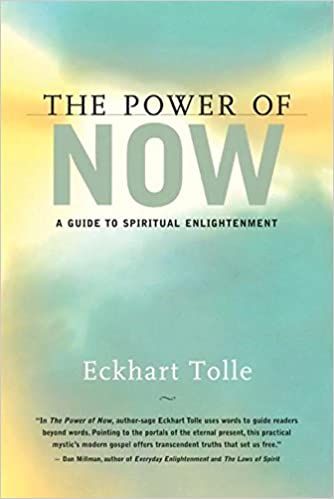
A critical first step toward greater self-insight involves ceasing to confuse your true self with the endless stream of thoughts flowing through your mind.
The bestselling book The Power of Now takes readers on a journey to find their deepest self through the lens of mindfulness and spirituality.
The book guides the reader through steps to help recognize and free themselves from ego in the form of defense mechanisms, automatic negative habits, and over-identification with thought. From here, readers can then discover their true nature and lasting contentment, rooted in the present moment.
Find the book on Amazon .
2. Self-Discovery Questions: 155 Breakthrough Questions to Accelerate Massive Action – Barrie Davenport
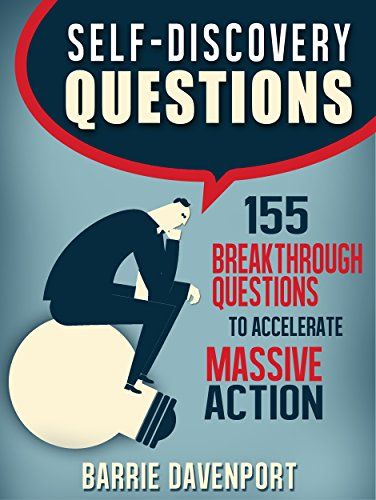
Not all of us have the resources to employ a self-discovery coach, making it all the more important to know what questions to ask on your self-discovery journey.
Barrie Davenport’s book of 155 powerful questions is a perfect companion for self-reflection and journaling, helping readers become less reactive and take charge of their lives and destiny.
Once you become acquainted with your answers, you can strengthen self-awareness , break out of automatic patterns, and feel empowered to make positive new life changes.
3. The 365 Self-Discovery Journal: One Year of Reflection & Development – Created by 21 Exercises
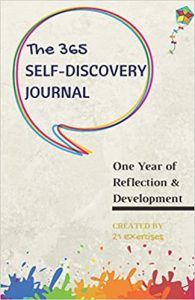
Journaling remains one of the best ways to pursue self-discovery and greater self-insight (Charles, 2010).
This book provides journal lovers with a year’s worth of challenging and original questions to guide self-discovery.
By combining each prompt with thought-provoking poems and quotes, this book is an excellent tool to help steadily expand the reader’s comfort zone and curiosity across domains ranging from career and finances to love and relationships.
4. The Quenza app
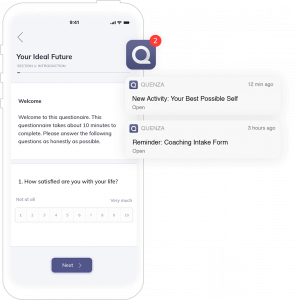
Quenza was designed by our very own team as a one-stop resource for coaches and psychologists wishing to remotely support their clients’ self-inquiry between scheduled sessions.
The app links with an online dashboard and growing library of science-backed activities you can customize and send directly to your clients’ smart devices, including audio meditations, guided visualizations, and many thought-provoking reflections.
Try the app, platform, and entire library of pre-built activities for 30 days for just $1.
5. The Waking Up app
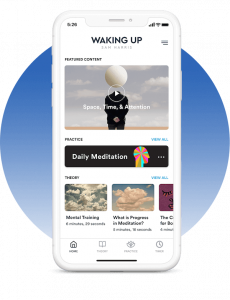
While Western takes on meditation tend to emphasize health and stress reduction, there is much more we can discover about ourselves through this powerful practice.
Waking Up , developed by philosopher and neuroscientist Sam Harris, features a rich array of audio-based meditations, exercises, and conversations with leading experts and teachers to help you make profound discoveries about the nature of your own mind.
This app is a top-rated resource for those seeking to dismantle illusions of the self and rediscover their true nature and purpose.
6. The Reflectly app

With the growing recognition of journaling as a tool for self-insight, new technologies are emerging to support this powerful practice.
Reflectly is a modern journaling app for self-care and greater happiness. Drawing on evidence-based approaches from positive psychology, mindfulness, and Cognitive-Behavioral Therapy, this app serves as an AI companion to help you manage negative thoughts and find greater happiness.
Among its personalized functions, the app includes daily quotes, a mood tracker , and personalized insights via its reporting features.
Throughout this post, we’ve discussed the importance of clarifying values to better understand what brings meaning throughout one’s journey of self-discovery. To this end, we invite you to check out our free Meaning & Valued Living Exercises Pack .
This pack features three of our top tools from the Positive Psychology Toolkit©, all of which center on the theme of values-based living:
- The Top 5 Values This exercise draws on key principles of Acceptance and Commitment Therapy to help clients begin brainstorming their values. Following this, clients will then prioritize these values in a list to identify those most central to who they are.
- Self-Eulogy This exercise invites clients to consider how they’d like to be remembered at their funeral as a means to identify and clarify values. Based on this, they can then consider how well they are living in alignment with these values.
- The Scoreboard Metaphor This exercise helps clients recognize how to enact their values through goal-setting. In particular, it draws on the metaphor of a basketball game to illustrate how living into one’s values is an ongoing process and that the paths by which we pursue our goals are opportunities to enact our values in daily life.
You can access all three exercises for free by downloading our Meaning & Valued Living Exercises Pack .
If you’re looking for more science-based ways to help others discover meaning, this collection contains 17 validated meaning tools for practitioners. Use them to help others choose directions for their lives in alignment with what is truly important to them.

World’s Largest Positive Psychology Resource
The Positive Psychology Toolkit© is a groundbreaking practitioner resource containing over 500 science-based exercises , activities, interventions, questionnaires, and assessments created by experts using the latest positive psychology research.
Updated monthly. 100% Science-based.
“The best positive psychology resource out there!” — Emiliya Zhivotovskaya , Flourishing Center CEO
Self-discovery is an ongoing process of stripping away that which is unimportant, reviewing our core values, and seeking to live in greater alignment with these inner truths.
Importantly, anyone can take steps toward greater self-knowledge . All that’s required is an attitude of curiosity and regular time out for meditation, reflection, or self-questioning.
We hope this article has left you feeling equipped for your journey of self-discovery, and if you decide to try out any of the tools or exercises we’ve explored, be sure to let us know in the comments.
We’d love to hear from you.
We hope you enjoyed reading this article. Don’t forget to download our three Meaning and Valued Living Exercises for free .
- 21 Exercises. (2018). The 365 self-discovery journal: One year of reflection & development. Author.
- Charles, J. P. (2010). Journaling: Creating space for “I”. Creative Nursing , 16 (4), 180–184.
- Davenport, B. (2015). Self-discovery questions: 155 Breakthrough questions to accelerate massive action. Bold Living Press.
- Elevate Life Project. (n.d.). Self discovery coaching . Retrieved October 11, 2021 from https://elevatelifeproject.com/self-discovery-coaching/
- Hollis, B. (2019, July 16). Who am I? Journaling prompts for self-discovery and self-reflection. Learning to Be Free . Retrieved October 11, 2021 from https://www.learningtobefree.com/2019/07/16/journaling-prompts-for-self-discovery/
- Horney, K. (1950). Neurosis and human growth: The struggle toward self-realization . Norton.
- Pagedar, A. (2021). Finding awareness: The journey of self-discovery . Author.
- Tolle, E. (2004). The power of now: A guide to spiritual enlightenment. New World Library.
- Waterman, A. S. (2011). Eudaimonic identity theory: Identity as self-discovery. In S. Schwartz, K. Luyckx, & V. Vignoles (Eds.), Handbook of identity theory and research (pp. 357–379). Springer.
- Waterman, A. S., Schwartz, S. J., Zamboanga, B. L., Ravert, R. D., Williams, M. K., Bede Agocha, V., … Brent Donnellan, M. (2010). The Questionnaire for Eudaimonic Well-Being: Psychometric properties, demographic comparisons, and evidence of validity. The Journal of Positive Psychology , 5 (1), 41–61.
Share this article:
Article feedback
What our readers think.
This is a great article for self-discovery, I recommend it to all, it’s a must read for the young minds.
Thanks to a great counselor. I appreciate your encouragement and efforts that have served as an eyes opener to self discovery and other resources that is helpful.
You have some great resources listed here in this article. Thanks for the great read! -Ryan
Appreciated, Nicole, for insight well done to start kicking where need be. Keep up te good work!
Thanks Nicole. I will explore some of the resources which sounds great. I work with medical students, some of whom are at the very beginning of learning reflective approaches to enhance their self knowledge. The challenge is always to find a variety of ways to promote engagement. You have given me some helpful ideas.
Thank You Dr, Nicole.
I have left you a message on LinkedIn.
Thank you so much for this wonderful article. Very useful and helps in the journey of self awareness and so helpful to the therapist and counselors who are using these resources to support clients. Heartfelt thanks and gratitude for all the resources that benefit the clients and counselors who otherwise would not be able to access such great quality articles and resources. Thank you. As a counselor who is doing a lot of free counseling these resources and articles are so helpful, cause I cannot afford them otherwise. Thanks for supporting the counselors and therapist and clients who ultimately benefit.
Thanks, Nicole … you shared a very interesting set of perspective.
Let us know your thoughts Cancel reply
Your email address will not be published.
Save my name, email, and website in this browser for the next time I comment.
Related articles

Reparenting: Seeking Healing for Your Inner Child
In our work as therapists, we often encounter the undeniable truth: we never truly outgrow our inner child. A youthful part within us persists, sometimes [...]
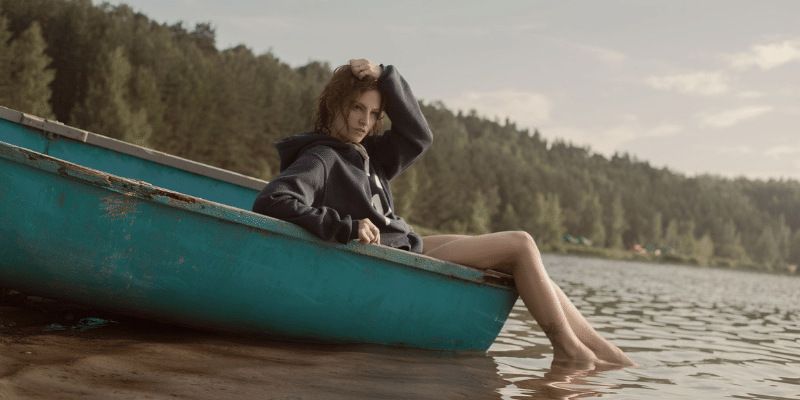
30 Best Self-Exploration Questions, Journal Prompts, & Tools
Life is constantly in flux – our environment and ‘self’ change continually. Self-exploration helps us make sense of who we are, where we are, and [...]
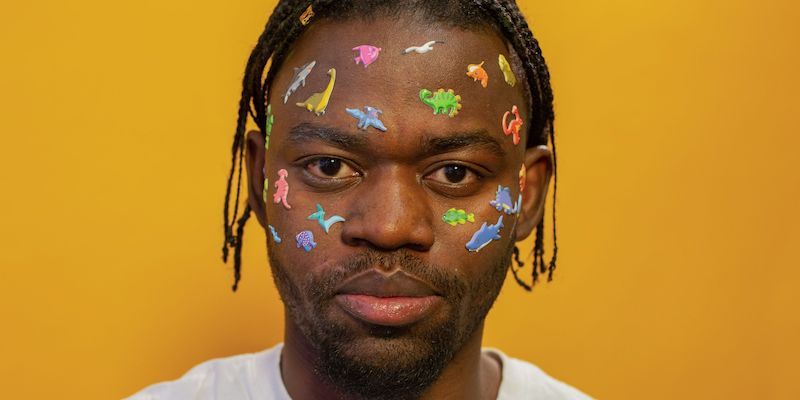
Inner Child Healing: 35 Practical Tools for Growing Beyond Your Past
Many clients enter therapy because they have relationship patterns that they are tired of repeating (Jackman, 2020). They may arrive at the first session asking, [...]
Read other articles by their category
- Body & Brain (50)
- Coaching & Application (58)
- Compassion (25)
- Counseling (51)
- Emotional Intelligence (23)
- Gratitude (18)
- Grief & Bereavement (21)
- Happiness & SWB (40)
- Meaning & Values (26)
- Meditation (20)
- Mindfulness (44)
- Motivation & Goals (45)
- Optimism & Mindset (34)
- Positive CBT (30)
- Positive Communication (22)
- Positive Education (47)
- Positive Emotions (32)
- Positive Leadership (19)
- Positive Parenting (16)
- Positive Psychology (34)
- Positive Workplace (37)
- Productivity (18)
- Relationships (44)
- Resilience & Coping (39)
- Self Awareness (21)
- Self Esteem (38)
- Strengths & Virtues (32)
- Stress & Burnout Prevention (34)
- Theory & Books (46)
- Therapy Exercises (37)
- Types of Therapy (64)
- Skip to main content
- Skip to secondary menu
- Skip to primary sidebar

Insideout Mastery
Create a Life You Love
Self-Discovery Journey: 17 Best Ways to Get Started
October 3, 2023 by Mick
Do you feel disconnected between how you show up in the world and your inner experiences? And do you struggle to find out who you are and what you’re meant to do in this world?
You’re not alone.
For the longest time, I felt the same way.
And I was looking externally for answers. I thought that getting rich, having a girlfriend, and accumulating more friends would make me happier.
But I was wrong.
Instead, I had to search within first.
Embarking on a self-discovery journey provides answers.
Self-insight leads to clarity and inner harmony.
Your life’s quality increases when you align your actions with your personality, core values, needs, and strengths. Every aspect of your life becomes more meaningful when you pursue what matters most to you.
The self-discovery process is key to success and fulfillment.
So, let’s take a step back from the hustle and bustle of life. It’s time to explore your essence to unravel your most authentic self .
Let’s dive in!
What is self-discovery?
Why is it important to discover yourself.
- The 2-step self-discovery process
How to start your self-discovery journey?
This post contains affiliate links, so if you buy something through my link, I earn a small commission at no extra cost to you. Note that I only endorse products that I’ve personally bought and enjoyed
Self-discovery is a lifelong process of learning who you are, what you want, and why it all matters to you.
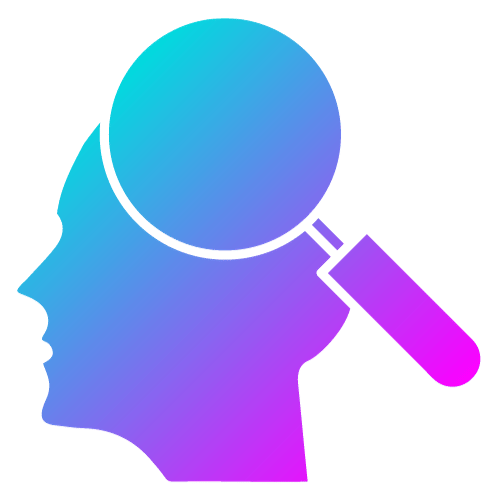
This includes many aspects like your values, beliefs, desires, emotions, strengths, weaknesses, passions, purpose, and more.
But why care about self-discovery?
The self-discovery journey leads to self-knowledge, self-acceptance, and a clearer understanding of your life’s path. And aligning your actions and behavior with your true self leads to more meaning, fulfillment, and joy.
Here’s why you should embark on self-exploration:
- Authenticity : Discovering yourself reduces the need for external validation and leads to congruent decisions, actions, and behavior.
- Self-awareness : Recognizing triggers and behavioral patterns allows you to respond to life’s challenges more effectively.
- Personal growth : Self-discovery allows you to better navigate your strengths and weaknesses, enabling you to reach your full potential.
- Fulfillment : Pursuing activities, relationships, and career paths that align with your passions and values increases life satisfaction.
- Self-confidence : Unraveling your strengths, values, and passions fosters self-belief in your ability to navigate life’s challenges.
- Purpose and meaning : Doing what matters most allows you to find deeper meaning in your actions and contributions.
- Healthy relationships: Understanding your communication style, needs, and boundaries sets the basis for effective communication and better relationships.
Self-discovery enables you to reinvent yourself and live a more intentional life. Let’s find out how you can make it happen.
2-Step self-discovery process
There are 2 general steps to the self-discovery process:
- Take action : Try something new and explore interests and ideas.
- Self-reflection : Reflect on your actions, behavior, feelings, and emotions to learn about your needs, preferences, and styles. Here’s an extensive list of questions to ask yourself .
Repeating those two steps leads to deeper self-understanding.
And if you do something related to each step every week, just imagine how much you’ll learn about yourself over the course of a year.
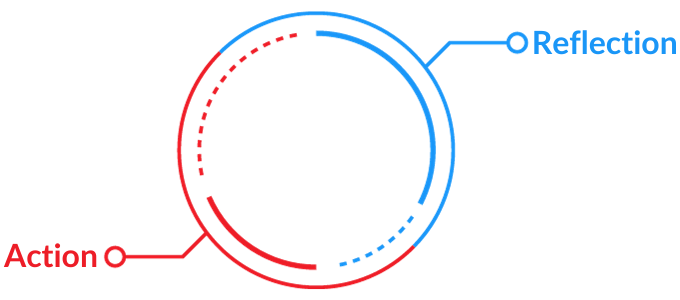
Now, let’s uncover…
Most people do one of three things:
- They take consistent action but rarely reflect.
- They reflect often but rarely try something new.
- Or they neither reflect nor take consistent action.
What most fail to realize is that self-discovery requires consistent action and continuous reflection. These two steps are essential if you want to discover yourself fast.
The next section provides ideas. Develop good habits or a daily routine around a few of those items to promote consistency.
Now let’s get started:
#1: Map your archetype
Trying to be like someone else is a recipe for disaster. And exploring your inner world is the only way to live a truly fulfilling life.
It took some time for me to understand that.
My extroverted friends got all the girls at school, whereas I struggled with introversion.
But being an introvert wasn’t my problem.
Instead, I was trying to be like my extroverted friends. I felt fake and inauthentic. And the girls smelled it from miles away.
I kept struggling with myself until I discovered my strengths as an introvert. Rather than trying to be the life of the party, I had to learn to be myself. And to have fun in my own way.
That’s sexy.
And not just in relationships – but in all areas of life.
You must understand who you are and what makes you tick to design your best life.
So what helped me to get unstuck after years of frustration?
I learned about myself through the best personality tests . These insights changed everything. And that’s why they’re my most recommended tool for people who’re just starting their self-discovery journey.
Here are my favorite options from Truity :
- 16 Personalities Test
- Enneagram Test
- Big 5 Personality Test
Once you’ve mapped your personality traits, it’s time to…
#2: Discover your superpowers
You excel in life when you work from personal strengths .
Of course, you should upgrade any weaknesses that interfere with your work and personal life. But for the most part, you’ll experience more joy and achieve better results when you lead with your superpowers.
Here are some questions to find out what you’re good at :
- What do you happily spend money on?
- What did you achieve, and how?
- What provides you joy?
- What gives you energy?
- And what compliments do you get often?
Use these questions to brainstorm. In addition, you can conduct a personal SWOT analysis . And then supplement your findings with a strengths test to gain a different perspective, such as the HIGH5 Test .
#3: Unravel your personal core values
Your personal values serve as the governing rules of your life.
You feel congruent when you make decisions and take actions that align with your core values.
And you’ll feel disconnected when there’s a mismatch.
Mapping your values can explain your emotions, feelings, and behaviors in certain situations. It helps you navigate challenges. And it guides your decision-making processes.
Below are some questions to unravel your values:
- What do you value most in life?
- When do you feel happy and most fulfilled?
- What areas of your life do you value the most and why?
- Who inspires you, and which of their traits inspire you the most?
- Finally, select what resonates from this list of core values .
Brainstorm a list of all the values that come to mind.
Then, delete the least important values until a top 10 remains. Finally, prioritize these 10 from high to low.
Consult your top three to five values often to live congruently.
#4: Make a list of interests
Unraveling your personality traits, strengths, and values is a great first step on your journey of self-discovery.
And I hope you did the exercises.
The next step is to list your interests.
What would you like to explore?
Write down everything that comes to mind.
This is your mini-bucket list, something to try at least once.
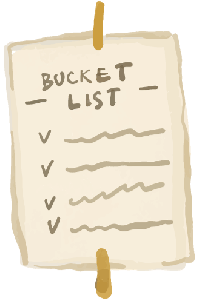
Here are some questions to inspire your list:
- What piques your interest already?
- What are potential passions you want to explore?
- What topics would you want to read a book about?
- What new skills do you want to learn ?
- What outdoor activities do you want to try out?
- What sports have you never done before?
- What new hobbies would you like to explore?
- What instruments would you like to play?
- What places would you love to visit?
Trying new stuff makes life more fun. It also teaches you a ton about yourself. And you might just stumble upon a new passion or career path like me.
Once you’ve got an extensive list, it’s time to…
#5: Create personal quests
Personal quests are your life goals .
And perhaps you already set personal goals . But if not, pick the most appealing items from your list of interests.
What would you like to explore first?
For example, say you want to travel through South America for a few months. And you want to learn Spanish in the next 2 months.
And perhaps you want to find meaningful work after your travels. So you decide that you’ll spend 6 months learning a high-income skill when you get back.
Now, you’ve already got a year’s worth of personal quests.
Even if you’re unsure about your long-term plans, you should set short-term goals and get moving.
That’s much better than dabbling or waiting around.
For starters, setting and achieving goals is a cure for boredom. But remember that taking action is what provides self-knowledge and insights, enabling you to set better and more meaningful goals.
Some questions to clarify your options:
- What skills would you like to master?
- What do you want to become an expert in?
- If money was no issue, what would you do?
- What would you like to achieve in life?
- How would you like to make a difference in the world ?
- What experiences would you like to accumulate?
- What places would you like to travel to?
- And what does your ideal self look like?
Write down everything that comes to mind.
And don’t forget to…
#6: Embark on a solo adventure
Backpacking by myself through Australia was one of the greatest catalysts for self-exploration.
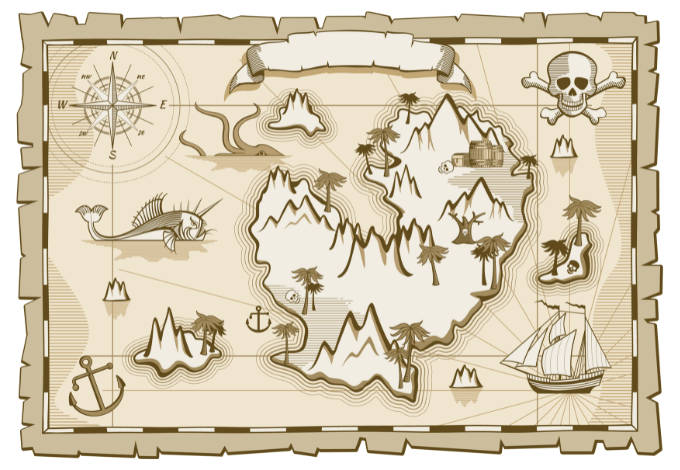
Solo adventures accelerate personal growth, independence, and self-awareness. Besides learning about yourself, you’ll learn a lot about others and the world around you too.
Backpacking was the best decision I ever made.
But you don’t have to travel for months.
Consider these solo adventures:
- Go on a hike by yourself
- Do a floatation tank session
- Go to a wellness center for the day
- Enjoy a holiday abroad by yourself
- Visit a silence retreat for a few days
- Make a little road trip by yourself
- Or travel alone for extended periods
Traveling alone can feel awkward and scary. But discomfort is okay. In fact, pursuing discomfort is the catalyst for personal growth.
And there’s nothing wrong with a solo adventure.
Quite the contrary.
You’ll unlock your greatness when you…
#7: Embrace solitude
There’s great power in silence.
But in a world that glorifies extroverted traits and constant connectivity, solitude may seem intimidating.
Yet, moments of aloneness are essential to turn inward. Tune out of external distractions to deepen the connection with yourself.
Solitude is the secret sauce to connect with your inner self.
Many successful people embrace periods of solitude for deep thinking and self-reflection. Think about Albert Einstein, Steve Jobs, Warren Buffett, J.K. Rowling, Mahatma Gandhi, and many more.
And there are many ways to embrace solitude.
Going on a solo adventure is an excellent option. But also consider the following practices and habits:
- Deep breathing
- Walking in nature
- Riding your bike
- Creative thinking
- Observing sunrise or sunset
- Engaging in creative acts
- Reflecting on your goals
- Disconnecting from technology
Schedule time for solitude. Although it may feel uncomfortable initially, exploring your inner world can lead to long-term success and happiness.
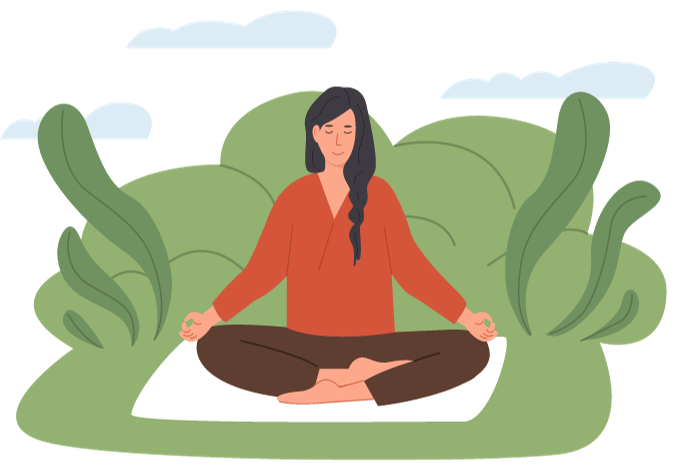
But you can also take a different approach and…
#8: Volunteer somewhere
Volunteering can lead to self-awareness while positively impacting others and the community. It exposes you to different perspectives and viewpoints you might never consider on your own.
It also provides a sense of purpose. And you’ll undoubtedly meet some amazing people in the process.
Here are some volunteering ideas:
- Environmental conservation such as community clean-up projects.
- Mentor or tutor (unprivileged) others and share your knowledge.
- Care for animals in need of love and attention in animal shelters.
- Help organize charity events, fundraisers, or community gatherings.
- Provide support and resources at homeless shelters.
- Organize or assist in creative workshops.
- Spend time with seniors at nursing homes.
- Volunteer at hospitals or healthcare centers.
- Get involved with organizations supporting social causes.
- Join disaster relief teams or organizations to assist communities affected by natural disasters.
There are many more volunteering opportunities. Perhaps your work has connections to volunteering organizations too.
Try it out and reflect on your experience.
#9: Start a writing practice
Something happens in the brain when we write.
The art of writing stuff down provides greater clarity – especially when you write with pen and paper. Having a writing practice is a transformative way to promote self-discovery for many people.
And yet again, there are many different options:
- Keep a journal to explore your thoughts, fears, and reflections.
- Daily goal-setting to create clarity and maintain focus.
- Keep a gratitude journal to appreciate the little things in life.
- Try creative writing , such as poetry, short stories, or fiction.
- Write letters to yourself, others, or your future self.
- Use mind-mapping techniques to organize thoughts and ideas.
- Compose a personal manifesto that outlines your core principles.
- Reflect on significant events or milestones in your life.
- Rewrite your story by crafting the perfect next chapter of your life.
- Write Morning Pages , a concept from The Artist’s Way . Write three pages of free-flowing thoughts every morning.
Putting thoughts into words clarifies your emotions, feelings, beliefs, needs, goals, and aspirations.
If you need some help, you can…
#10: Use self-reflection cards
Do you lack the inspiration to sit down and journal? If so, you might enjoy daily journaling prompts to get you started. Use these reflection cards to tap into the benefits of journaling .
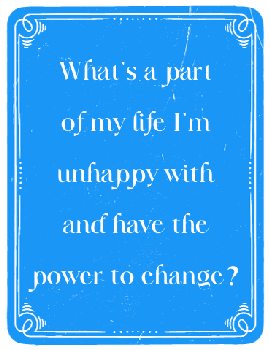
Grab a new card each day and answer the question.
You can answer it out loud.
But again, there’s magic in writing stuff down. Writing slows your thought process, forcing you to sit with each thought a little longer.
These unique questions help you to think about different aspects of your life. And they also encourage you to ask the hard questions.
So definitely try this tool on your journey of self-discovery.
And for the dreamers…
#11: Visualize your perfect life
Visualization is a great technique to manifest success and abundance .
But it’s also very effective to explore opportunities.
Lay down and close your eyes for the next 5-15 minutes. Imagine yourself achieving and having everything your heart desires.
- What do you see?
- How do you feel?
- And who are you with?
Then imagine that you did everything there was to do, bought everything you wanted to buy, and visited all the places you wanted to see.
What would you do next?
Exploring your ideal life is fun, fosters a positive mental attitude , and ignites a greater sense of purpose beyond the superficial stuff.
Another idea is to go back in time and…
#12: Dig into your childhood
Your past is a goldmine for self-discovery.
It holds valuable clues to the building blocks of your identity.
Childhood memories, experiences, and influences shape who we become as adults. And delving into your past can reveal patterns, beliefs, and values that still influence you today.
Here’s how to revisit your earlier life:
- Gather memory triggers such as items, photographs, old diaries, or any objects that remind you of your childhood.
- Begin with your earliest memories and gradually work your way through various stages of childhood. Remember moments of joy, challenges, fears, and significant events.
- Reflect on your emotions as you recall past experiences. They’re powerful indicators of what mattered to you during those times.
- Identify influential people throughout your life and consider how they shaped your thoughts, beliefs, and behaviors.
- Identify patterns in your thoughts and beliefs. And evaluate whether they still influence your actions and decisions today.
- Journal your discoveries to record insights and realizations.
Remember that personal growth and self-discovery is the goal of exploring your childhood memories. So, make sure you celebrate positive memories and learn from any challenges.
This practice may uncover the roots of many beliefs and behaviors.
Alternatively, try…
#13: Walking meditation
Walking through nature is one of my favorite ways to become self-aware.
And I occasionally plan a long hike to connect with myself.
I’ll grab a bag, pen, and my favorite self-help journal . And I’ll pack some of my favorite snacks and drinks. Then, I’ll go far out to explore a new place on foot.
I usually split my long walk into sessions:
- Listening to podcasts
- Listening to music
- Immersing myself in nature
- Brainstorming new ideas
- And exploring my thoughts
Regardless of what I’m doing, thoughts and ideas always arise. And when they do, I’ll explore them or write them down to explore later.
Feel free to give your spin to it.
But be mindful of what you do during your walk. If you listen to podcasts 100% of the time, you still distract yourself from your inner voice.
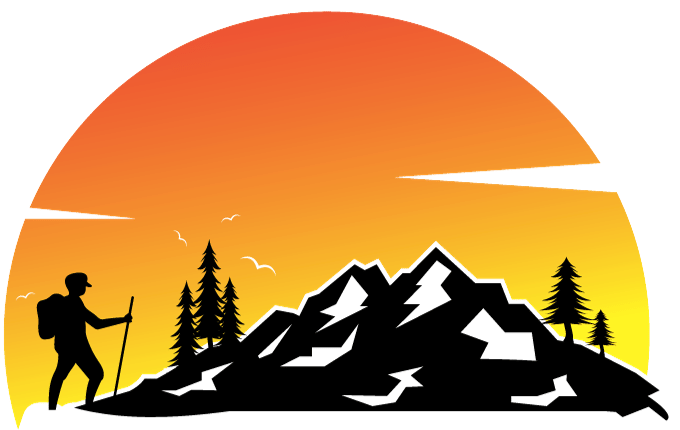
#14: Learn new skills
Skill development is a fantastic way to make yourself more valuable and attractive to the marketplace. And the process also unlocks self-insights and new possibilities.
For example, I started my blog to crystalize my thoughts and deepen my personal growth journey. But blogging also taught me more about writing, marketing, web development, and search engine optimization (SEO).
Although I didn’t know about SEO before, I found it fascinating.
So I quit my finance career to pursue an internship with my new long-term goal to become an SEO consultant.
And today, I’m a freelance SEO specialist. I love what I do and I’ve the freedom I always desired to work from anywhere.
All because I decided to start blogging.
Where can you start?
Here is some inspiration:
- Brainstorm skills you already want to learn more about.
- Browse the catalog of Udemy to explore interesting skills.
- Explore high-income skills you can learn from home .
- Read my list of new skills to learn at home .
- Learn a new language with Rocket Languages .
- Start a personal project, like a blog, podcast, or YouTube channel.
- View the book categories on Amazon and dive into subcategories to discover new topics.
Schedule time in your week to learn a new skill or upgrade existing ones if you want to unlock your wildest dreams and aspirations.
#15: Try something new – and do so often
When was the last time you did something new?
We often are too busy or scared to try new things. And we fail to see the immense value of engaging in novel experiences.
But there are many benefits of stepping out of your comfort zone and seeking new experiences.
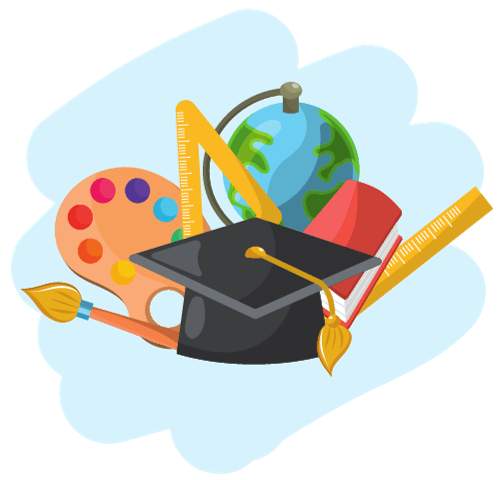
It’ll improve your confidence, creativity, and resilience.
And it’ll make your life much more exciting and interesting.
Finally, it boosts self-awareness.
So challenge yourself to engage in novel activities regularly.
In your downtime, you can use the following…
#16: Self-discovery questions to raise self-awareness
Our greatest gift is to wonder.
And self-questioning is an effective tool to become curious about your thoughts, feelings, needs, values, goals, and aspirations.
Here’s a list of questions to ask yourself:
- How am I living in alignment with my core values?
- What currently brings me the most joy and fulfillment?
- What are the activities or environments that drain my energy?
- How do I define success and happiness?
- What are my biggest fears, and how do they hold me back?
- What are the greatest obstacles that keep me from my goals?
- Is there anything I should change about my current situation?
- What do I like best about myself and my situation?
- How did I cope with recent stress and challenges?
- What activities or hobbies make me lose track of time?
- What are some self-limiting beliefs I hold about myself?
- How did I handle criticism and feedback from others?
- What are patterns or recurring themes in my daily life?
- What are my most recent accomplishments?
- How do I want others to see me?
- Which relationships do I want to invest more time in?
- What are the things I need to let go of to move forward?
- What are some past experiences that shaped who I am?
- How do I define my identity and sense of self?
- What do I want to learn or explore more in life?
- What kind of legacy do I want to leave behind?
- How do I ensure consistent personal growth?
- What are my favorite ways to express creativity?
- What lessons did I learn last week?
- How did I recently take care of my physical, emotional, and mental well-being?
Frequently asking yourself these self-discovery questions fosters self-awareness , continuous self-improvement , and self-esteem .
#17: Accept yourself fully
Accepting yourself is crucial for well-being, success, and happiness.
And here’s how you can cultivate self-acceptance:
- Treat yourself like a good friend in distress.
- Identify and challenge negative self-limiting beliefs . Replace them with positive affirmations and constructive statements.
- Acknowledge and celebrate your successes, no matter how small.
- Strive for progress, not perfection.
- Set realistic goals to gain momentum.
- Express yourself authentically through activities you enjoy.
- Forgive yourself for past mistakes and learn from them instead.
- Spend more time around people who support and uplift you, rather than those who bring you down.
- Seek support if you struggle to accept yourself. A therapist can guide you through the process and provide a fresh perspective.
Recognize that accepting yourself is an ongoing process.
And it’s normal to have ups and downs along the way.
So stay patient and self-compassionate.
What’s next?
The process of self-discovery is transformative and unlocks authenticity, inner harmony, and personal fulfillment.
Gaining deeper insights into your values, desires, and beliefs empowers you to make better decisions. And it’ll open doors to better opportunities, meaningful relationships, and a more purposeful life.
Key takeaways:
- Self-discovery involves exploring your personality traits, strengths, values, desires, interests, purpose, feelings, emotions, and more.
- Take consistent action and try novel things often to expand your comfort zone and uncover what you like and dislike.
- Self-reflect often and embrace periods of solitude.
Challenge: I encourage people who are just starting to take a personality test . And if you already did then challenge yourself to do something new this week.
Also, check out the following resources to dive deeper into self-discovery and personal development:
- The best guided journals
- The best personality tests
- The best books on self-awareness
- The best books on finding your life’s purpose
Finally, are you ready to embark on a journey of self-discovery and unlock your true potential? Sign up for weekly insights for personal growth and living an authentic and meaningful life!
Mick is a personal growth enthusiast and was able to use it to transform his life. He now helps others pursue their dreams, create positive change, and build better lives through self-improvement.
LaToya Rachelle
Where Women Thrive
Finding Yourself: The Definitive Guide for Your Journey of Self Discovery
📌Share this post
Do you sometimes feel like something is missing in your life and that you are searching for the answer? That despite your best efforts, you just can’t seem to find yourself or the path that’s right for you?
Have you ever felt that there’s more to you than meets the eye? That there’s more lying within the depths of your being, waiting to be discovered?
Well, gorgeous, if you’re nodding your head in agreement to any of these questions that means it’s time to embark on a journey of self discovery.
And while a journey to self discovery can be a little intimidating to start (we’re going to dive deep ), I don’t wan’t you to worry; I’m here to guide you through it.
Consider this post as your trusty compass, your handy guidebook packed with clear, actionable steps, and your personal cheering squad all wrapped into one.
This journey is sooo worth it.
Let’s get started!
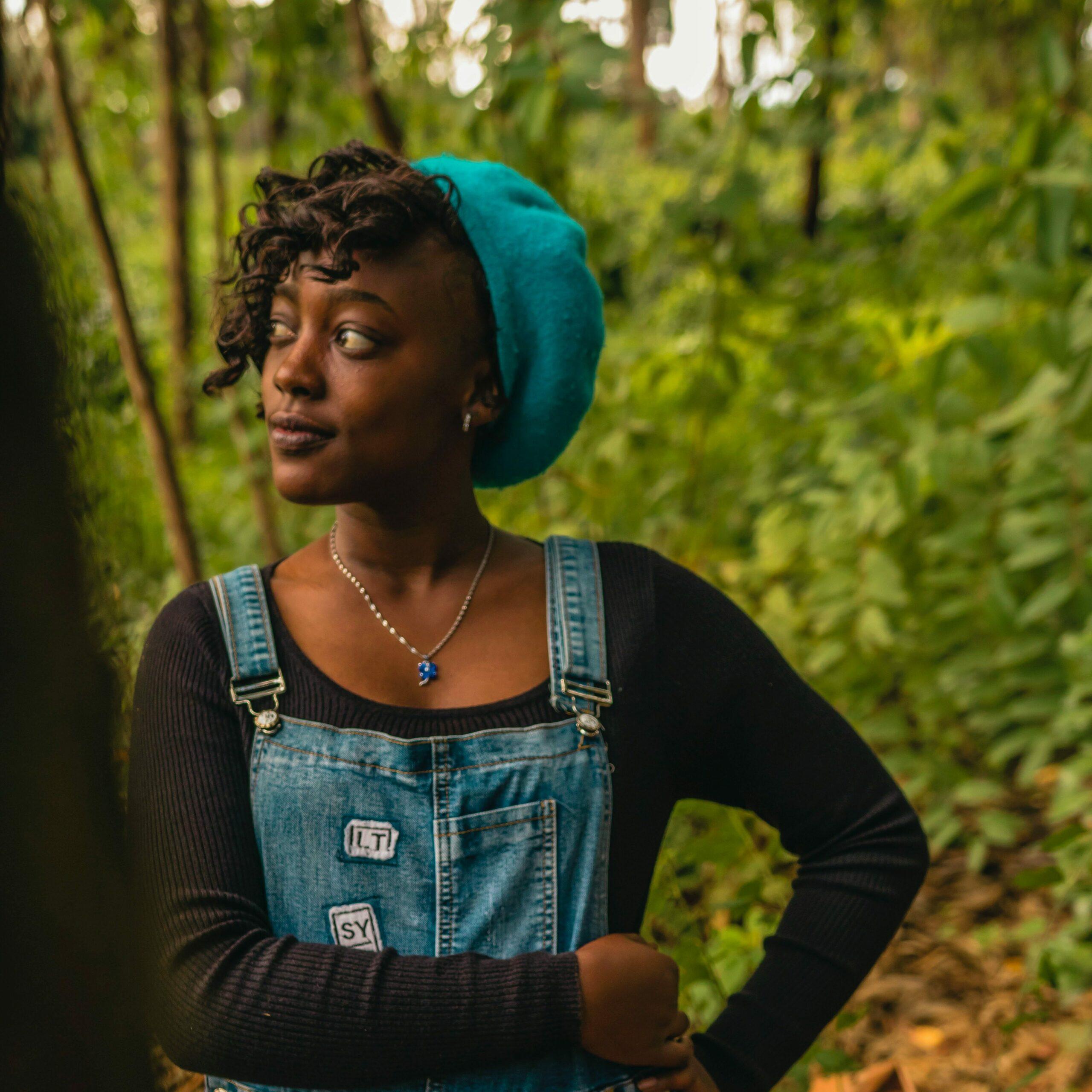
See What's Inside
Why Go on a Journey of Self Discovery?
Unraveling your true self & embracing your uniqueness, navigating the journey, ready to uncover your authentic self grab our self-discovery journal & workbook for free, #2 – practice mindfulness and meditation, #3 – try new experiences, #4 – practice self-compassion, #5 – make self-care a priority, staying open to change & growth, building your self-discovery support network, 7 ways to cultivate authenticity while on your journey, celebrate your progress, final thoughts, understanding self discovery.
So, what’s this journey all about?
It’s about embarking on a treasure hunt within your own heart and mind.
It’s recognizing that you’re not just a passenger in your life; you’re the driver .
You get to choose the route, set the pace, and decide which turns to take.
It’s a path of uncovering your hidden strengths, passions, and dreams.
It’s understanding your quirks, facing your fears, and growing into the best version of yourself possible .
You may have heard the old saying “Know thyself” – this is exactly what embarking on a journey of self-discovery is all about.

The truth is, if you don’t invest in getting to know yourself, no one else will — and you’ll forever be living a life that isn’t in alignment with your truest self.
You deserve to know exactly what makes your heart sing.
And you deserve to live a life that’s uniquely yours.
A journey of self-discovery will bring clarity and empower you to make better decisions in both your personal and professional life.
It will help you to form deeper connections, build stronger relationships , and find a sense of belonging in this world.
Ultimately, it will unearth parts of yourself that have been hidden away for far too long — allowing you to become the version of yourself that you were always meant to be.
Plus, I can guarantee that self discovery will grant you a level of inner peace and understanding that’s unlike anything else.
You know what’s amazing?
You’re not just another puzzle piece in this world; you’re a one-of-a-kind masterpiece.
And there’s no better time than right now to start uncovering your magnificence.
When you embrace introspection and explore your authentic self , you start to uncover what makes you a masterpiece and understand yourself better.
You learn more about what makes you tick, what strategies work best for you in different situations, and who you want to be.
This process of unraveling — it’s empowering and humbling all at the same time.
I want you to think of yourself as an onion (minus the tears, of course).
Each layer you peel back reveals a new facet of your being.
Start with a little self-reflection ➡️ What are your passions? What are the moments that have defined you? What are the dreams you’ve been nurturing deep within?
As you unravel these layers, you’ll likely discover a bunch of strengths you probably didn’t even know existed.
For example, maybe you’re a great listener, a creative thinker, or a problem solver.
Embrace these strengths – they’re your superpowers on this journey. 💪
And don’t forget, acknowledging your weaknesses is just as crucial; they are opportunities for growth.
Don’t be afraid to unravel what those weaknesses are. Facing your fears is an essential part of this journey.
To uncover those, you might ask yourself ➡️ Are there aspects of myself I’ve been avoiding? Are there challenges I’ve been hesitant to take on?
Acknowledge them.
When you confront your fears, you’re not just conquering them, you’re empowering yourself.
Setting your intentions is an important first step in this process.
Ask yourself…
- What do I want to discover about myself? (Is it a hidden talent, a sense of inner peace, or a deeper connection with your passions?)
- What changes do I want to make?
- Where do I want this journey to take me?
Write your responses down.
The answers to these questions and others you come up with will give you direction and purpose.
During this process, make sure you remain curious and have an open mind.
Curiosity will lead you to ask more questions, to dig deeper, and to explore the unexplored corners of your thoughts and feelings.
And an open mind will allow you to consider new perspectives, even if they challenge your current beliefs
Now, it’s important right about now to acknowledge that this journey won’t always be a smooth one.
There might be moments of doubt, fear, and uncertainty.
Sometimes negative self talk might try creep in and attempt to throw you off track. Just know that that type of self-sabotaging behavior is a temporary distortion of your thinking. Don’t let it stop you!
When you encounter a limiting belief, pause, question it, and challenge it. Replace it with a positive affirmation or a truth that reflects your capabilities.
These tough moments are a part of the process.
Look at these feelings as an opportunity to pause, to reflect on what you’ve been through so far, and to move forward with greater clarity.
5 Tools & Tips for Self-Discovery
Now that you’re navigating your journey with clear intentions and an open mind, I’m going to equip you with some powerful tools and techniques to make this expedition even more transformative.
#1 – Self Discovery Journaling
Journaling is an incredibly effective way to explore and understand your inner world, unlock your creativity, reflect, discover, and achieve clarity. It’s a great way to show up for yourself every day .
And guess what? I have a special treat for you! A free Self Discovery Journal , designed to help you to get the most out of your journey.
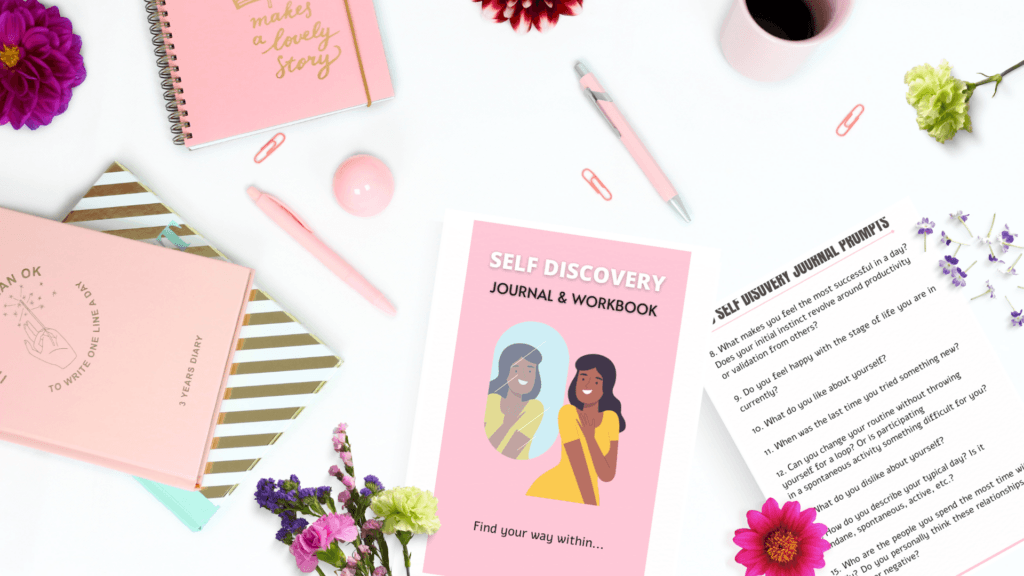
It’s packed with prompts, activities, and thought-provoking self-discovery questions that will spark insights and bring clarity into what matters most in your life.

Receive your free printable and other resources sent directly to your inbox!
Check your inbox. 💌
You won’t be able to get in touch with your inner self if you’re constantly pushing through life without pausing for a moment of reflection.
Mindful living is about using all of our senses to become aware of our thoughts, feelings, and experiences without judgment or attachment to them. It’s living in the present moment and tuning into our inner wisdom.
Similarly, meditation is another incredibly powerful tool for self-discovery – helping to reduce stress and anxiety while promoting empathy and emotional intelligence.
The key takeaway here is that it’s important to prioritize some moments of sitting quietly with your thoughts each day and having regular moments of stillness and reflection during your self-discovery journey.
Ever wanted to learn an instrument, paint, dance, or cook a new recipe ?
Trying new experiences isn’t just about expanding your skill set; it’s about discovering facets of yourself you never knew existed.
Each new endeavor is an opportunity to explore your interests and passions.
Embrace new experiences to open your eyes to the world around you. This could be anything from trying a new activity or cuisine, learning a foreign language, or joining a club.
These are all great ways to challenge yourself and explore different parts of your identity.
Self-discovery is a lifelong journey and that can be tough, especially when you encounter setbacks. That’s why having self-compassion is so important.
Be patient with yourself and have the courage to accept your flaws, mistakes, and weaknesses. Remember that no one has it all figured out – everyone makes mistakes!
Treat yourself with the kindness you deserve.
By learning to practice self-compassion, you’ll be able to keep going on your journey of self-discovery even when the road gets tough.
Remember, the journey of self discovery is about growth , not perfection. So don’t be too hard on yourself and don’t compare your journey to anyone else’s.
The last tip is to make self-care a priority in your life. It’s easy to get overwhelmed and stressed out while on your journey of self-discovery, so it’s important to take care of yourself before anything else.
Take time for yourself – go for walks, give yourself some “me” time to relax or do something that brings you joy.
An added bonus to this is you’re likely to find new insights about yourself while doing something that you enjoy.
Related: 32 of the Best Self-Care Gifts for Women

As you start exploring and getting to know yourself better, it’s important to recognize that change and growth are not only inevitable, they are also going to be key parts of your self-discovery journey.
Instead of being fearful, I want you to embrace the idea of change and growth.
Accept that you are going to learn and become a different person as you go through this process.
Embracing these moments can be some of the most liberating experiences on your journey to discovering yourself.
Change invites you to step out of your comfort zone, where the magic of self-discovery often happens.
And growth provides the opportunity to learn and build upon new ideas, concepts, and skills.
Welcome the twists and turns of your journey, and know that even setbacks contribute to your growth.
Every experience, positive or negative, is a valuable lesson just waiting to be learned.
Now just a heads up, as you learn more about yourself it’s likely that you’ll find that some things no longer align with who you are and what you want. And you know what? That’s absolutely okay!
Don’t hesitate to let go of the things that no longer serve your growth. Instead, be open to the new ideas that will help you move forward in life.
The self-discovery journey can often be a lonely one. But it doesn’t have to be!
Find people who will support and encourage you on your journey.
Building a strong support network can help you stay motivated and encouraged during your journey.
Ask close family members or friends to check in with you as you make progress. Or consider joining a support group where you can connect with others who are embarking on their own journey of self discovery.
Surround yourself with positive, supportive people who understand what you’re going through. Having an encouraging circle of individuals can make all the difference on your self-discovery path.
Some Self-Discovery Support Network Examples:
*You are your most reliable support system
Building a support system isn’t just about receiving; it’s also about giving too.
Your unique experiences and insights can inspire others on their own journeys.
So engage in reciprocal support – share your discoveries, ask for the ok to offer advice, and be a source of positivity for those around you.
As you progress on your journey of self-discovery, it becomes crucial to wholeheartedly embrace your true and authentic self.
You might be wondering, “Well, what does that mean?”
Authenticity means being honest and true to yourself. It’s about being real, even when it feels uncomfortable.
It’s about honoring your thoughts and feelings without apologizing for them or feeling ashamed of them. And being aware of what drives you, how you react and respond to different situations and feelings.
Being authentic also includes integrating the new changes you experience into a sense of self that still remains true to you.
Here are 7 ways you can foster authenticity as you continue on your self discovery journey:
Authenticity thrives when you release the need to meet others’ expectations. Embrace the freedom to be yourself, even if it doesn’t conform to societal norms or others’ opinions.
Perfection is an illusion, and authenticity is born from embracing your imperfections. Instead of striving for flawlessness, embrace your quirks and vulnerabilities – they’re what make you beautifully unique.
Authenticity demands that you speak your truth, even when it feels uncomfortable. It’s important to remember that expressing your truth doesn’t mean being unkind or hurtful though. Share your thoughts, feelings, and experiences without fear of judgment. Your vulnerability can inspire others to do the same and foster an atmosphere of open communication and growth.
Setting and maintaining boundaries that protect your physical, mental, and emotional well-being is an act of self-respect. By clearly defining what’s acceptable to you and communicating it to others, you’re safeguarding your authentic self and fostering healthy relationships. This practice empowers you to create relationships that align with your true self.
Authenticity blooms when your actions align with your values. Reflect on your choices – are they in harmony with who you are? Seek activities, relationships, and pursuits that resonate with your authentic self.
Your journey, with all its triumphs and challenges, is part of your unique story. Embrace it with open arms. Owning your story, without shame or apology, is an act of authenticity.
Self-awareness is the cornerstone of authenticity. To be authentic, you must understand who you are. That’s why I’ve put so much emphasis on the importance of taking time for self-reflection throughout this post. Refine your understanding of yourself through questions such as: How do I want to show up in the world? What values drive my decisions? What parts of me need healing? Pay attention to how other’s words and actions make you feel too – it can help provide insight into what matters most to you.
Cultivating authenticity is an ongoing process, and it looks different for everyone. It’s about being true to who you are in each moment, without the need to hide or conform. As you continue on this journey, remember that your authentic self is your most valuable treasure.
It takes courage to embark on a journey of self-discovery. And while you’re on it, be sure to take time for moments of celebration and appreciation – you deserve it!
Give yourself credit for all that you have achieved along the way, no matter how small.
Remember those times when you faced your fears head-on? That’s something to celebrate.
Or that moment when you embraced your unique quirks instead of trying to hide them? That’s definitely a victory worth acknowledging.
Each step you take, every insight you gain, and all the hurdles you overcome are stepping stones to your growth.
So, how can you celebrate yourself?
Treat yourself to a day of indulgence – whether it’s a favorite meal, a relaxing bubble bath, or that book you’ve been wanting to read.
You could write yourself a heartfelt letter, acknowledging your progress and the qualities you admire in yourself. Or gather with friends who uplift you, and share your wins with them.
And don’t forget to take a moment in quiet solitude to honor your journey, appreciating the remarkable person you are becoming.
These celebrations aren’t just about rewards; they’re affirmations of your commitment and an expression of self-love.

It’s never too late to start anew – you are the author of your own story.
Your journey of self discovery is about learning to understand, accept, and love yourself. So trust in the process.
You have all the tools and capabilities you need to create a fulfilling life story.
The journey is ongoing, with new experiences and revelations each day. And it’s not just any journey; it’s YOUR journey.
So stay curious, be brave, embrace change – and remember that wherever life takes you, authenticity will always be your superpower.
I sincerely hope that this guide proves to be invaluable to you as you embark on your journey of self-discovery.
May it provide you with the guidance and insight you need to take those initial steps towards uncovering your true potential.
But this isn’t the end; no, it’s just the beginning!
I invite you to download my FREE Self Discovery Journal .
This printable workbook will help you gain clarity about your life goals and values, uncover your passions, and find meaningful ways to express yourself.
You can download it here .
You are capable of anything you put your mind to – so believe in yourself as much as I believe in you. 😘
Until next time,
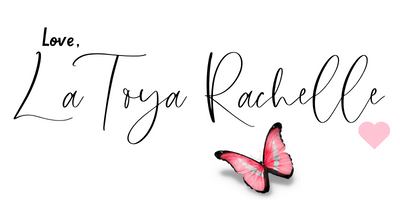
You may also like
About LaToya Rachelle
LaToya Rachelle, author and creator of LaToyaRachelle.com, is dedicated to empowering women on their journey to self-discovery and personal growth. Through her writings, she shares insights on self-care, happiness, manifestation, success habits, and more, and provides invaluable tools to help you unleash your fullest potential. Join LaToya as she inspires and guides you to become the best version of yourself.
Subscribe @lovelatoyarachelle
Love, latoya rachelle.
Love, LaToya Rachelle is a lifestyle channel that provides quick, easily digestible videos full of tips and tricks to empower you to become the best version of yourself possible.

TED is supported by ads and partners 00:00
Unmasking Yourself Through A Journey Of Self-Discovery
5 Self-Discovery Tips Therapists Swear By
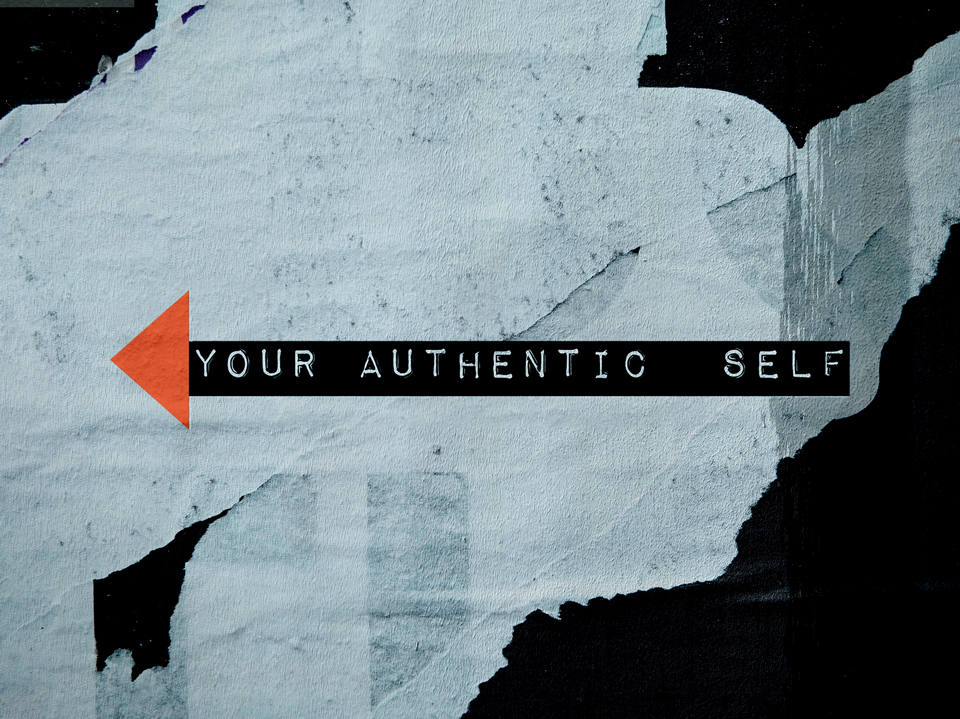
We’re all just out here trying to ~find ourselves~, right? It’s very human to be curious about what moves you, motivates you, and makes you…well…you. Which brings us to the fun and sometimes frightening practice of self-discovery.
The American Psychological Association defines self-discovery as “the process of searching for and finding one’s unique self or identity.” In other words, it’s everything that makes you who you are, like your personality, interests, goals, beliefs, values , and cultural background, says psychotherapist Sharon Martin, DSW, LCSW .
Yeah, there’s a lot of ground to cover. And because we’re constantly changing, it’s very unlikely that your journey of self-discovery will be wrapped up in a little bow anytime soon. Honestly, we all might still be discovering things about ourselves when we’re 80, and that’s OK. The goal isn’t to figure yourself out as fast as possible. So, what is the point, and how will you know you’re on the right track?
Self-discovery is important for your mental health and self-love for a few reasons. When you know what matters to you and you lean into that, you feel like you have purpose , says Dr. Martin. Also, knowing who you are means you can find people you share similarities with, says licensed psychologist Jeannette Craigfeld, PsyD , helping you feel seen and supported. According to the experts, you’ll know you’re getting somewhere when you find yourself doing more of what lights you up and you just generally feel more comfortable with how you show up in the world.
All that said, self-discovery can be a scary or lonely place. You might not feel like you can safely express yourself to others or you might have a hard time accepting what makes you who you are. If that’s true for you, talking to a mental health professional—or even going to group therapy—might be something to consider doing, Dr. Craigfeld notes.
But you don’t need to be in therapy to learn more about yourself. You can do a ton of self-discovery work on your own, without the help of a mental health pro. Here’s how.
1. Spend time reflecting on yourself—by yourself.
It’s easy to get caught up in what your family, friends, or society at large thinks is best for you. And it can sometimes be hard to separate those narratives from what you actually desire out of life. So, solo time can give you space to reflect on things that make you who you are, like your interests and values (which we’ll get into in a bit!), without feeling like you need to meet others’ expectations, says Dr. Craigfeld.
While you’re by yourself, try journaling or thinking about these get-to-know-you questions from Dr. Martin:
- What’s something I believe in strongly?
- Am I a morning person or a night person?
- What's been the most meaningful experience so far in my life?
- What do I like to do for fun?
- What are some things I’m worried about?
- What are my goals?
- What am I feeling ?
- If I'm not feeling great, is there anything I need to do right now to feel better?
You don't have to ask yourself the same questions every single day, but if you haven’t reflected like this before, you might want to start by checking in more frequently (maybe once a week) before scaling back to once a quarter or even once a year, suggests Dr. Martin.
Really try to limit distractions while you’re checking in with yourself, says Dr. Craigfeld. That way, you have more room to pay attention to your thoughts and feelings.
2. Notice how you are alone vs. with other people.
Listen, not everyone needs to see the deepest bed rot version of yourself. But it’s worth noting if you routinely present yourself (and your interests/goals/values) to others in a way that’s not totally aligned with how you really view yourself. So, Dr. Craigfeld suggests you start by imagining you’re spending the day in the house alone. What would you wear? How would you act? How would you spend your time?
Then, think about how you present yourself when you’re out in the world and around other people, suggests Dr. Craigfeld. “Basically, how do you want other people to see you or look at you, and how much does that match with the person you are when you're just you by yourself?” she says.
Even if you notice a mismatch, you might not want to change anything, Dr. Craigfeld notes. Maybe you’re not ready to let certain people in your life see the more authentic side of you. Noticing the difference might just be enough for you right now.
But, if you do want to fix this disconnect, you can play around with how you physically express yourself—your hair, makeup, clothes, whatever—in front of others, Dr. Craigfeld suggests. Then, do the same for how you act. You can ease into this by starting with people you feel especially safe and comfortable around and lean into a side of yourself you wouldn’t normally show them, she says.
3. Write or create something.
Creative outlets can be great pathways to self-discovery because they can help you explore what you think and feel without any input from other people, Dr. Craigfeld says. It’s just you and your writing or whatever it is you’re doing, she says.
There’s also something about getting creative that can help you express what’s in your head when you’re stuck in an unproductive loop of thoughts, says Dr. Craigfeld. Creativity lets us connect with emotions in an easier, non-judgmental way because it’s not as filtered or censored as speaking out loud, art therapist Marygrace Berberian, PhD, LCAT, LCSW , previously told Wondermind .
So if your self-discovery journey is feeling stalled, sign up for an art class or try out some painting or free-writing by yourself. You might be surprised by how into it you get, notes Dr. Craigfeld.
4. Do a values audit.
Think of your values as the blueprint for how you want to dedicate your time or, as Dr. Martin notes, the “building blocks of who you are as a person.” Figuring out what actually matters to you—instead of what you think you’re supposed to do or what other people want you to do—is a way to tune into what makes you you , says Dr. Craigfeld. On the other hand, being disconnected from your values can make you feel unhappy and like your life isn’t on track, says Dr. Martin.
You can do a values audit by writing down what you’ve been spending your time and energy on lately and rating (on a scale of 1 to 10) how significant that stuff is to you, suggests Dr. Craigfeld. Then, you can set goals for what you want to be spending more (or less) time and energy on, she says. In other words, assessing what’s important to us can help us make choices that honor those things, says Dr. Martin.
Another fun way to think about what you want to prioritize in life is asking yourself the following, courtesy of Dr. Craigfeld: If I could wave a magic wand, what would I want to change about my life? Who knows! That might mean dedicating more time to your family or finding a different job.
5. Give yourself wiggle room.
Maybe you literally don’t know the answers to some of these very big questions. Or maybe you feel like you have so many answers and you don’t know what to do with them—or if they’re even actually true to you. That’s when trial and error comes into play, says Dr. Martin.
You can start by seeing if doing stuff that you used to enjoy still gives you the same feelings of joy and purpose it once did, suggests Dr. Martin. Again, what mattered to you in your teenage years might be completely different from what matters to you now in your thriving 30s, so don’t be surprised if you’ve changed, she says. But, also, maybe you still freaking love playing with animals, riding your bike, or connecting with people.
If you’ve stumbled upon some vague realizations in your self-discovery journey—like, Maybe some spirituality is missing in my life— don’t be afraid to brainstorm and workshop around that theme, notes Dr. Martin. You can try out different religions or various places of worship within a specific religion. Or, hey, maybe astrology ends up being more your vibe.
Finally, be patient and have some grace for yourself during this process. Remember that you are one brilliant, ever-evolving enigma on a floating rock in space, and there is no rush in figuring it all out right this second.
Wondermind does not provide medical advice, diagnosis, or treatment. Any information published on this website or by this brand is not intended as a replacement for medical advice. Always consult a qualified health or mental health professional with any questions or concerns about your mental health.

Sign up for our newsletter to get expert advice and candid convos delivered right to your inbox

12 Techniques to Help You Start Your Journey to Self-Discovery
...because you’re so worth knowing.

Our editors handpick the products that we feature. We may earn commission from the links on this page.
If so, take comfort in knowing that, just as self-love looks, feels, and unfolds in wildly different ways from one person to the next, so does the practice of learning about yourself. And while your journey might involve traveling across oceans or leaning into a spiritual practice like meditation , the quest for self-discovery isn’t as simple as collecting stamps on your passport or stretching across a yoga mat .
So if you’ve been thinking about pulling the lid off of your unmet dreams, desires, passions, strengths, and values, stay with us. We rounded up the experts and asked them to share their self-discovery rituals, techniques, and tools, along with some empowering ideas to keep in mind as you explore deeper realms of who you are and who you wish to become.
Start a morning journaling practice.
Julia Cameron, bestselling author of The Artist’s Way: A Spiritual Path to Higher Creativity , coined the now-famous ritual she calls “morning pages,” which is essentially three pages of stream-of-consciousness writing to be completed upon waking. “Morning pages are like sending a telegram to the universe that says, ‘This is what I like. This is what I don’t like. This is what I want more of. This is what I want less of,’” Cameron tells Oprah Daily.
Don’t put pressure on yourself to perform for the pages, though. Cameron emphasizes that they’re designed to access your curiosities. “This disciplined daily practice is private, sacred, and full of surprises. Many people begin to find themselves fascinating. This is because morning pages train you to see your own worthiness,” she says.
Make Living Well a Daily Practice with Oprah's The Life You Want™ Planner

Take an audit of your relationships.
Terri Cole, licensed psychotherapist and author of Boundary Bos s , suggests kicking off your self-discovery journey with a brave and honest inventory of your relationships—particularly the ones that might be draining or toxic .
“Ask yourself, Where do I feel resentful, unseen, or taken advantage of? Before you can more deeply know yourself, you absolutely must determine your boundaries with others . You need to become more discerning about who gets access to you. Because not everyone should,” she tells Oprah Daily.
Make a list of things that delight you.
“Make an ‘okay’ and a ‘not okay’ list. It might contain things that either enhance or hinder your sense of ease. These small shifts are important because they offer ways of showing yourself that you’re worthy of your own attention and consideration,” says Cole.
For example, you might decide that your home will feel more cozy and inviting if you fill it with softer light and scented candles . Or it could simply be a matter of deciding that you need to craft a thoughtful email to your boss about your lack of work-life balance.
“The idea is to stop doing anything that goes against your constitution. Making small adjustments will allow you to experience more comfort and peace in all areas of your life,” says Cole.
Lean into a daily spiritual practice like meditation or yoga.
Ryan Haddon , spiritual life coach and meditation teacher, says that engaging in a quiet spiritual practice helps you recognize that any negative thoughts you have, no matter how loud or persistent, don’t have to run the show.
“We have upwards of 30,000 unconscious thoughts a day, most of which are negative. By curating a spiritual practice like meditation or yoga, you’re able to choose uplifting thoughts, rather than be at the mercy of the negative ones that lead you into a downward spiral. That’s true empowerment because you realize you have influence over your own mental and spiritual states,” she says.
Have a thoughtful, loving conversation with your inner child.
No matter how long you live, there will always be a child inside you, tugging at your attention, hoping to be acknowledged and comforted. Cole says that revisiting your vault of childhood wishes and wounds is a key part of any self-discovery journey, though it’s the part that makes most people roll their eyes.
“It can be difficult, but I’ve observed that you have to go back to the scene of the crime in order to understand why you are the way you are and why you’re sensitive to certain things. The child inside of you needs to be heard so that you can give your adult self permission to stop hiding or doing whatever it is that may have kept you from fully knowing yourself,” says Cole.
Pay attention to what lights you up.
What have you fantasized about doing for so long that you never got around to doing? It could be skydiving, studying a foreign language , or launching a side-hustle designing business. Or following your inspirations might simply look like carving out time each day to indulge in the books, documentaries, and podcasts that captivate you, says Rachel Rodgers, CEO of Hello Seven and author of We Should All Be Millionaires ,
Whether it’s combing through your old bucket lists, banging around on a piano, or curling up with a cup of coffee and a rapturous novel, focus on what makes you feel the most alive, even if it's just for a few minutes a day.
Consider leaving your comfort zone.
One of the easiest decisions in the world is to stay where you are. Rodgers stresses that self-discovery happens only when you’re willing to step into the future that you can’t stop dreaming about.
“Sometimes we feel trapped by the space that exists in between who we’ve been and who we want to be. There might be something you want to explore or try, but you’re afraid to let go of what’s familiar. If something is calling you, whether it's an adventure, a life change, or a new business idea, listen,” says Rodgers.
Know that when you get excited about your own growth and self-discovery, everyone wins.
If you aren’t acting from a place of authentic joy and fulfillment (when that's possible, at least), no one in your life will ever link arms with the best of you. So, attempt to prioritize yourself—we know, it's easier said than done—because if you want to serve the world, you’ve got to start by standing tall in your truth.
“I recommend that everyone sit down and brainstorm about 25 ways that they, their loved ones, and their community will benefit when they start prioritizing their needs and desires. Then read, reread, and add to the list often."
Of course, there are stages with every self-discovery journey, and some are more pleasant than others.
Over the years, Cameron has observed some interesting stages as readers move through her Artist’s Way program. In the beginning, there’s often a feeling of elation, quickly followed by a stretch of anger upon realizing the ways they may have settled in their life. Next comes a period of bargaining, which is then followed by the peaceful acceptance of one’s newfound evolution. And, finally, if one persists through the disorienting stages, there comes expansion, which Cameron says is the beautiful realization that it’s safe to take risks and reach for higher realms of fulfillment.
“Years ago, I taught these workshops where the rooms had these low-hanging styrofoam ceilings. You’d enter the space and think, Oh, wow, the ceiling is quite low. But then you realized you could tap it and move it to the side and see that there was actually 10 more feet of space above it. This is sort of how I see self-discovery. We often go through life thinking we’re a certain height—creatively, intellectually, spiritually. But as you start to tap the ceiling, you’re revealed to be so much more than you ever imagined,” says Cameron.
Remember that this journey is about you, and that you’re the one in control.
Deep exploration often invites big revelations. You might suddenly feel a flicker of desire to live a life that’s more adventurous and colorful, or to feel more seen and understood in your relationships. Or, perhaps, you might realize that you feel like you’re a hostage to a career or a lifestyle. The process can be intense and overwhelming, and you might feel pressured to act upon those epiphanies with haste. If so, Cole says it’s critical to remember that you don't have to burn the village down, so to speak. In fact, much of self-discovery and personal transformation can happen with a whisper.
“Don’t fear the personal inventories and discoveries, because you don’t have to change or blow up anything right away. The process can be gentle, and can simply look like getting honest with yourself about the things that feel right and the things that don’t. You can even stay in a situation, if you choose, but you’ll be doing it mindfully. And that’s the root of all self-discovery,” she says.
Embrace the ongoing process of your personal evolution.
While it’s tempting to view self-discovery as some shining destination on high, that’s not reality. Self-discovery is more of an ongoing pilgrimage that we make throughout our lives—sometimes one that’s jagged and lopsided, with unexpected stops, disorienting detours, and restarts.
Rodgers says we should give ourselves grace and freedom to revise our needs as the seasons change and the years pass. “Never stop discovering new levels of who you are and what you want. Constantly reevaluate your schedule, your priorities, and your life,” she says.
Coles believes that, in essence, self-discovery is the audacious act of choosing to no longer be driven by the wounds of the past, and deciding to become increasingly self-aware and self-determined. It’s about seeking the progressive realization of your own happiness, and discovering that the only life you can ever truly save is your own.
“Knowledge is power, but self-knowledge is the most powerful. This whole journey is one long, beautiful inquiry—an inquiry about knowing you,” says Cole. “And, I promise you, whatever that entails, you are so worth knowing.”
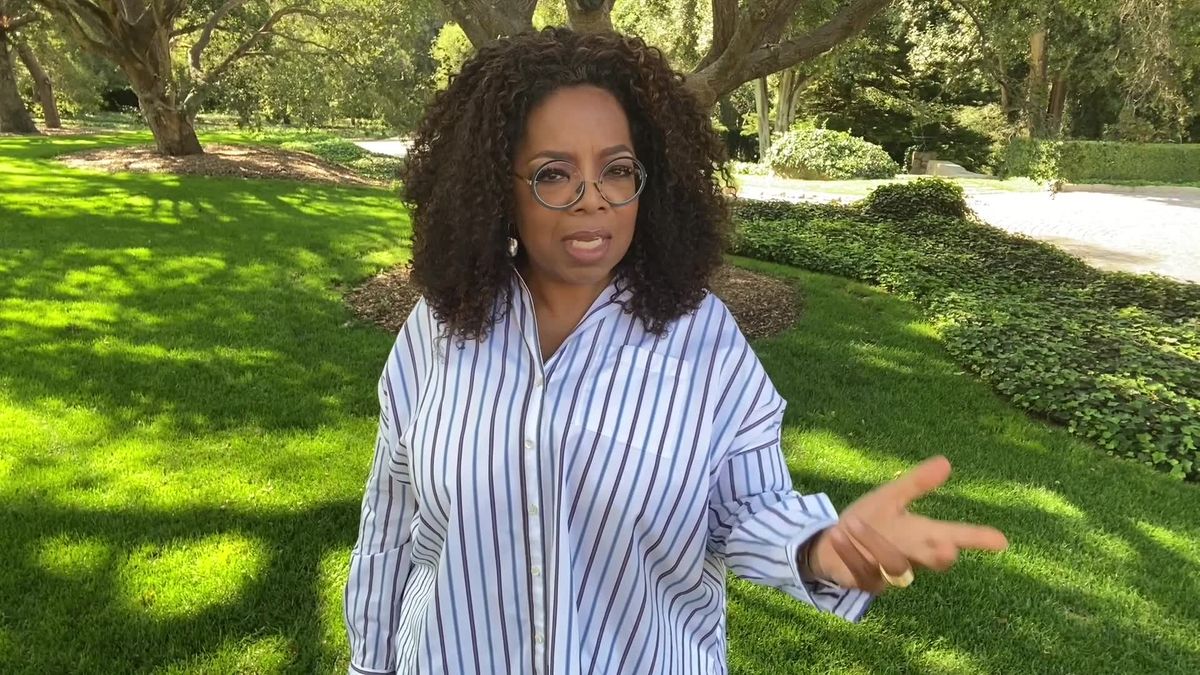
Lacey Johnson is a writer and editor whose has contributed to Cosmopolitan, Marie Claire, Woman’s Day, POPSUGAR and others, and is the founder of The Wonder Report. She feels most at home in airports, and is a radical seeker of engrossing conversation. Also a coffee connoisseur.
Welcome to Oprah Insider!

Oprah on Honoring Those Who Have Sacrificed

Oprah on the Bombshell in her New Book Club Pick

Oprah Wishes You a Happy Mother’s Day
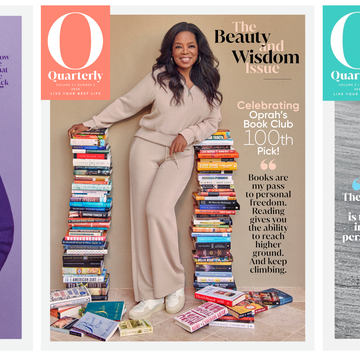
Download Your Exclusive Oprah Daily Digital Issues

Oprah on Teens and Mental Health
Watch Now: Oprah on the Teen Mental Health Crisis
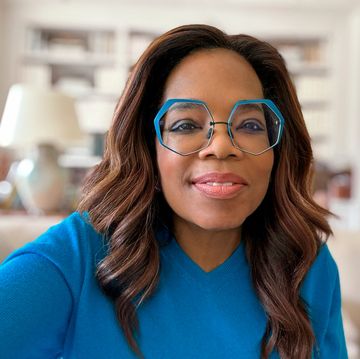
Oprah Shares Where She First Found Her Voice
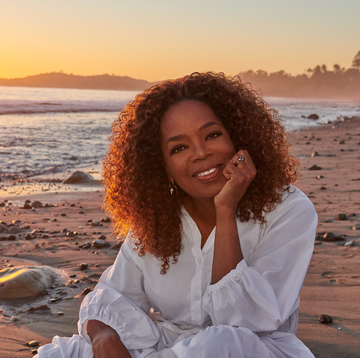
A Special Welcome from Oprah

Oprah on Working Through Mom Issues
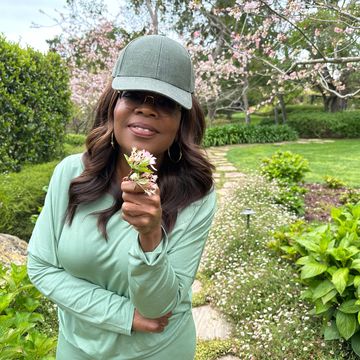
Oprah on the Lessons Japan Taught Her
Oprah and Brooke Shields on Healing a Mother Wound

Navigating the Journey of Self-Discovery

Embarking on a Journey of Self-Discovery
Have you ever considered what truly makes you tick? We each embark on our own unique journey through life, complete with highs and lows, successes and challenges. Yet, at the core of all our experiences lies the personal quest of self-discovery. This journey is about exploring who we are, understanding our desires, and figuring out our purpose.
The journey is not a linear path, nor is it a destination where one arrives. It’s a continuous process that can yield profound insights into our deepest values and beliefs, often leading to an enriching life filled with meaning and satisfaction.
Understanding the Importance of Self-Discovery
At its heart, self-discovery is about self-awareness. It’s asking the question, ‘Who am I?’ beyond your job title, responsibilities, or social status. The answer is not always clear or easy to find, but it is vital. Without self-awareness, you might find yourself on a path not truly aligned with your inner self.
Self-Awareness as the Foundation
Self-awareness lets you understand your strengths and weaknesses, your passions, and fears. It is the foundation for emotional intelligence, important for building strong relationships, achieving personal goals, and navigating life’s decisions. Knowing yourself allows you to live more authentically, and make choices that resonate with your personal values, leading to a more fulfilling life.
The Role of Values and Beliefs
Your values and beliefs shape your perception of the world. They influence your thoughts, actions, and reactions. Understanding what you value most can help steer your life in a direction that brings genuine happiness and satisfaction.
Starting Your Journey of Self-Discovery
The journey to self-discovery can start at any point in your life. It could be triggered by a significant event, or it can begin with the simple desire to know yourself better. Here are some steps you can take to start your journey:
- Reflect on Your Life: Take time to look back on your life experiences, accomplishments, and failures. Reflect on the lessons learned from each experience.
- Identify Your Passions: Ask yourself what you love to do, even if you weren’t getting paid for it. What activities bring you joy and make time fly by?
- Iron Out Your Goals: Set short-term and long-term goals. What do you want to achieve in different areas of your life?
- Embrace Change: Be open to change and willing to grow. Your journey is about evolution, not staying stagnant.
Journaling can be a powerful tool during this process. Writing down your thoughts can help to clarify them and give you a tangible record of your inner world.
The Power of Questions in Self-Discovery
Asking yourself probing questions can drive the discovery process deeply. Here are some you might ponder:
- What moments in my life have brought me the most happiness and fulfillment?
- What values do I hold that I would never compromise on?
- How do I define success for myself, apart from societal standards?
- What are the fears or beliefs holding me back from pursuing my passions?
Give yourself the space to answer these questions honestly. The answers might not come immediately or easily, but they will provide valuable insights into your true self.
The Role of Relationships in Self-Discovery
Our relationships often serve as mirrors reflecting parts of ourselves we might not see. Engaging in deep, meaningful conversations with friends, family, or mentors can reveal aspects of your personality and hidden strengths or beliefs. Listen to how others perceive you, not as an absolute truth, but as additional data to consider on your journey.
Overcoming Obstacles on the Trek to Self-Knowledge
Your journey of self-discovery will not be without challenges. It’s natural to encounter obstacles.
Fear of What You Might Find
The idea of uncovering aspects of ourselves that we may not like can be intimidating. Remember that self-discovery is a process of understanding and acceptance, not judgment. It allows you to work on areas you may want to improve.
Inner Resistance
Change can be hard, and the mind often resists it. Acknowledge the resistance but remind yourself of the benefits of self-understanding and personal growth.
External Pressures
Social expectations and other people’s opinions can sometimes derail your journey. Focus on what truly matters to you, rather than conforming to external standards.
Inspiration from Self-Help and Self-Development Resources
Books and other resources on self-help and self-development can offer guidance and support through your journey. For instance, the seminal book “The Seven Habits of Highly Effective People” by Stephen Covey provides timeless principles that can help you understand and manage yourself better. The resources you find can serve as a compass, but remember that your journey is entirely your own.
Staying Committed to Your Journey
Consistency is key. Regular self-reflection and mindfulness practices like meditation can help maintain a strong connection with your inner self. Dedication to the journey, despite inevitable distractions, is crucial for continuous growth.
The Evolving Nature of Self-Discovery
Understand that self-discovery is a lifelong endeavor. Who you are can evolve with your experiences and the insights you gain. So the questions you ask yourself today might bring different answers 10 years from now, and that’s part of the beauty of being human.
Finishing Thoughts
Embarking on a journey of self-discovery invites us to explore the depths of our being, to seek a richer understanding of ourselves and our place in the world. It equips us with the knowledge to live with intention and make choices that resonate deeply with who we are. The path is not always easy, but the rewards are innumerable and personal growth is assured. So let’s step forward with curiosity, openness, and courage, knowing that with each step, we’re becoming more tuned with the essence of who we truly are.
Subscribe to our mailing list to get the newest self-help content!
Sign up for the daily newsletter.
Cultivating a Positive Self-Image
The art of communication: key to a healthy relationship, related articles.

Dealing with the Habit of Constantly Comparing Yourself to Others
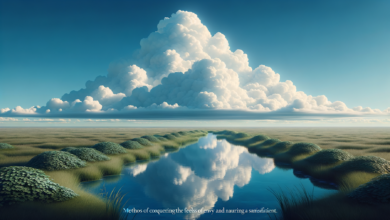
Strategies to Overcome Envy and Cultivate Contentment

Addressing and Overcoming a Victim Mentality

How to Stop Being a People Pleaser
Leave a reply cancel reply.
Your email address will not be published. Required fields are marked *
Save my name, email, and website in this browser for the next time I comment.

14 Powerful Self-Discovery Activities for Your Personal Journey
OVERVIEW : This comprehensive guide outlines the three stages of self-discovery as a developmental model, highlighting the common pitfalls along one’s journey and offering tools and methods for each stage.
______________
Know thyself— the famous aphorism from Ancient Greece.
No better phrase can capture the essence of self-discovery.
Let’s dive deeper into what this aphorism means …
What is Self-Discovery?
Self-discovery is the process of learning about and finding oneself.
There are many different facets of this discovery process. In the earlier stages, you learn about your personality type, what you value, your strengths, weaknesses, talents, dreams, shortcomings, aspirations, and interests.
In a later stage, self-discovery is about getting to know the parts of yourself that were “disowned” in childhood, commonly called the shadow.
The process of self-discovery is a continual movement from less conscious to more conscious, from less aware to greater awareness of oneself.
Similar to the hero’s journey motif, the self-discovery journey is the path toward mature adulthood.

Self-Discovery versus Self-Development
These two concepts are intrinsically linked together.
On its own, self-discovery is simply about revealing what’s always there: who you are on a conscious level.
Self-development is about molding and growing in various areas, including physically, emotionally, cognitively, and spiritually.
Can you engage in self-discovery without self-development? Only on a very cursory level. Why?
In the act of getting to know yourself, you’re placing your attention on various aspects of your being. In doing so, development will likely take place.
Although there’s a large self-improvement industry that promotes ways of “bettering oneself,” the reality is that development is a natural process .
Early childhood trauma and conditioning hinder that process, but once it’s initiated in adulthood, it tends to take on a life of its own.
As such, self-development is an integral part of one’s self-discovery process.
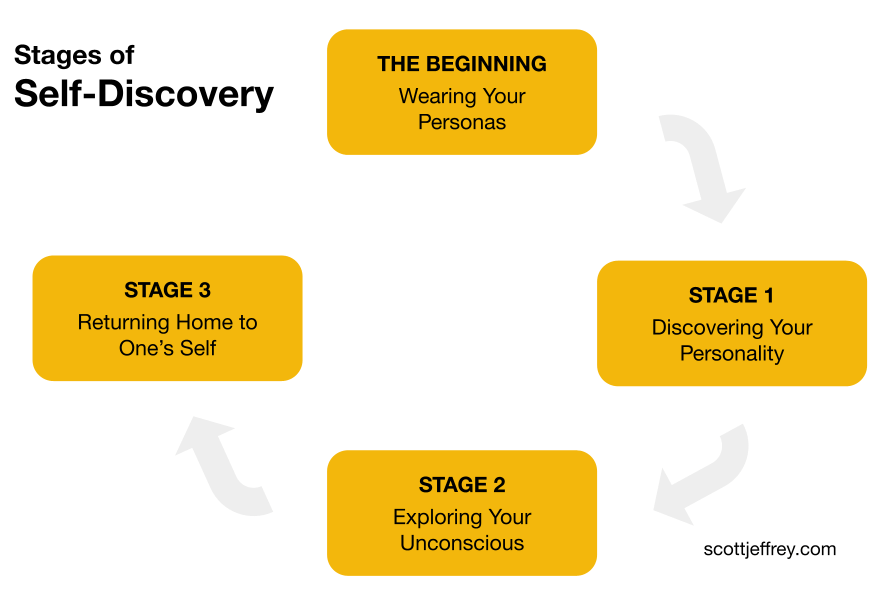
What are the 3 Stages of Self-Discovery?
The common stages of self-discovery outlined here largely mirror the stages of human development from transpersonal psychology but in a very simplified format.
Stage 1: Discovering Your Conscious Self (Personality)
Stage 2: Exploring Your Personal Unconscious (Shadow)
Stage 3: Returning Home (The Self)
First, we’ll examine each of these stages in more detail. Then, we’ll explore the self-discovery activities commonly used at each stage.
Before we dive into these three stages, let’s examine where we start: the persona.
Stage 0: Wearing Our Social Masks
In early development, we are mostly focused on adjusting to our environments and “fitting in” at home, school, and anywhere else we find ourselves.
Our identities at this stage are largely defined by “others” in a social context. That is, our identity is mostly a series of personas (social masks) designed to help us “fit in.”
When we’re in the persona stage we’re not technically in the self-discovery process yet.
We create our personae unconsciously and subconsciously. It’s the starting point from which self-discovery can be initiated.
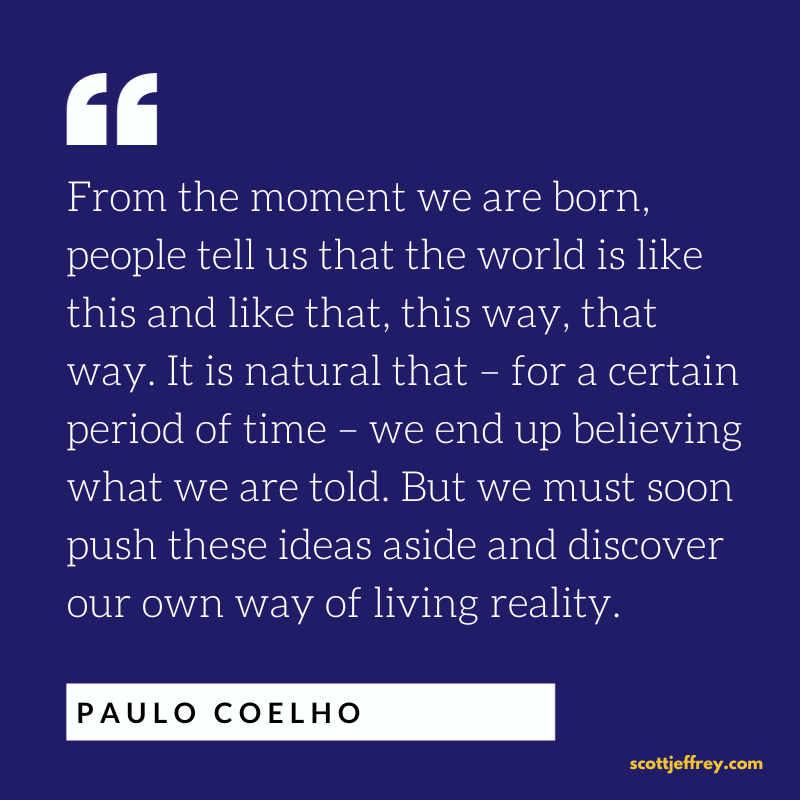
Self-Discovery Stage 1: Discovering Our Conscious Personality
Stage 1 can be a fun stage for many individuals. It’s the part of self-discovery that many people associate with the term “self-discovery journey.”
Stage 1 is marked by discovering one’s conscious personality including strengths, weaknesses, habitual patterns, drives, desires, and aspirations.
Self-discovery comes through our engagement with life. Like any good hero’s journey , life is filled with trials and tribulations. Setbacks and victories. Each experience provides a window into ourselves.
If we pay attention, we learn through our reactions and interactions with others and the world.
In this initial stage, we develop a strong curiosity about ourselves. It’s common at this stage to take a wide range of assessments.
Learning about your “personality type” is highly instructive: it highlights many of your greatest strengths and mortal weaknesses. It illuminates common behavior patterns that you may not have noticed.
You’ll discover a myriad of patterns that you spontaneously engage in without knowing why. At this stage, you’re also likely to inquire about your core values to clarify what you stand for and what’s most important to you.
You might take up journalling, and begin capturing your big life goals, dreams, and even a vision for yourself.
This stage usually goes on for many years. In fact, many individuals never move beyond this initial stage of self-discovery.
Self-Discovery Stage 2: Exploring Our Personal Unconscious
The second stage of self-discovery brings you toward your inner world where the meaning of “self-discovery” vastly changes.
Stage 2 often begins either at midlife or after a major life event that rattles you to the core. This event could be a divorce, the death of someone close to you, physical illness, or some other crisis.
Psychiatrist Carl Jung often said this inward turn should happen at midlife: after you’ve built a healthy ego in the world (career, home, family, etc.). That is, the first half of life is meant to be more externally oriented while the second half is internal.
In tribal cultures, at midlife, members of the tribe would go on extensive walkabouts or vision quests. They returned as different people, now taking up a more shamanic-type role as ritual elders of their tribe.
For us, this inward turn is more about engaging in inner work , addressing our childhood trauma, exploring our dream world, and getting to know our shadows . Here, internal observation, self-awareness , reflection, self-analysis, understanding, sensitivity, and inner honesty are required.
In stage 2 of self-discovery, we address our deep-seated internal tensions and splits within our psyche.
The self-identity that we created for ourselves in stage 1 becomes less codified and more fluid. As we move toward psychological integration, that self-identity moves further into the background.
This stage will also last many years depending on your life circumstances. For example, if you’re in midlife and still very active in the world, there may be less time available for self-reflection and inner discovery.
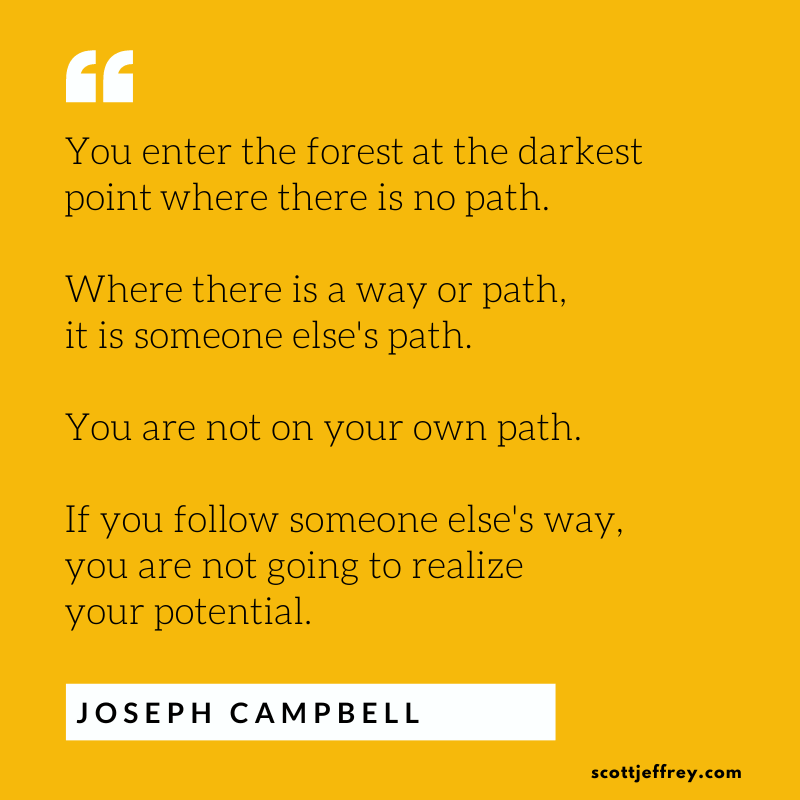
Self-Discovery Stage 3: Returning Home of the Self
In the third stage of self-discovery, an individual returns home to their Self (capital “S”).
The meaning of “self” changes greatly at this stage. The self in “self-discovery” when we set out on our path was our conscious personality. It starts to become a distant memory at this later stage.
This stage is marked by transcending an exclusive identification with the self (small “s”) and realizing one’s true Self (self-realization).
The ego we developed in the prior stages now must take a back seat so that the original Self can return.
In The Ego and the Dynamic Ground , professor of philosophy Michael Washburn called it “regression in the service of transcendence.”
This stage requires us to strip away everything we are not so that our Original Nature can take its rightful place in the Center.
In Taoist philosophy, they make a distinction between the conscious spirit and the Original Spirit.
The conscious spirit (ego or “acquired mind”) is what we develop in stage 1. This self-identity is a set of conditioning from the external world.
In contrast, the Original Spirit is our primordial Self that is unconditioned by the insanity of this world.
At this stage, the focus is on self-inquiry, self-observation, neutrality, stabilizing the mind, and moving toward inner stillness.
In transpersonal psychology, they often call this stage integration . Maslow called it self-transcendence . Jung referred to it as wholeness —the final stage of individuation .
_________________
Now, let’s review a series of self-discovery activities and exercises you might use at each stage of your personal discovery journey.
Self-Discovery Activities for Stage 1
Here are seven self-discovery activities and exercises you can use for Stage 1 of your journey:
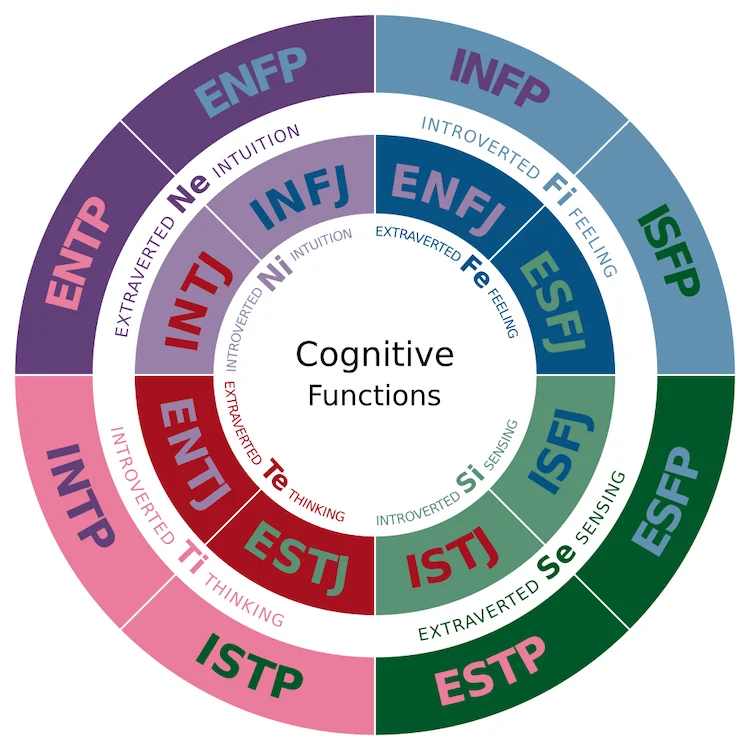
Myers-Brigg Personal Assessment (Common Self-Discovery Activity)
Personality Assessments
Personality assessments are one of the most common self-discovery activities most people use.
Any quality personality assessment will reveal different aspects of your personality. They can be very insightful—especially when you’re in the beginning stages of self-discovery. Three popular ones include:
- The Enneagram
- Human Design Engineering
- Myers-Briggs Type Indicator
(Just do a quick search. There are many paid and free versions online.)
Values Assessment
Getting to know your core values is an essential self-discovery activity. Self-aware individuals tend to know what’s most important to them. Knowing your core values helps you make better decisions.
If you don’t know your values yet, you can go through my popular 7-Step Values Assessment .
Strengths Assessment
Getting clarity on your strengths and weaknesses is another excellent self-discovery activity..
While we learn our natural strengths and weaknesses by observing our life experiences, the VIA Character Institute offers a free survey to help you determine your strengths right away.
See my guide on authentic happiness for a primer on this topic from positive psychology.
Personal Vision Casting
A personal vision can help guide you through your self-discovery journey. It helps clarify what’s most important to you.
A compelling vision can also help you remove distractions and stay focused on your long-term self-development goals.
Get step-by-step instructions on how to craft your vision statement .
Wheel of Life Assessment
As you begin to flush out who you are and what you stand for, you’ll likely determine specific goals you have for self-development. It’s important to understand that we all have multiple lines of intelligence and areas of focus.
The Wheel of Life assessment is a good coaching tool to clarify your self-development goals for different areas of your life.
Active Journaling
Journalling can be a powerful aid in this stage and the next. A journal can be used to capture your dreams, ambitions, life lessons, and insights on the written page.
Self-Development Plan
Some individuals prefer to have more structure to help them proceed with their discovery process and self-development.
Creating even just a basic self-development plan with the data you gather above can help you reduce distractions and stay focused on your long-term objectives.
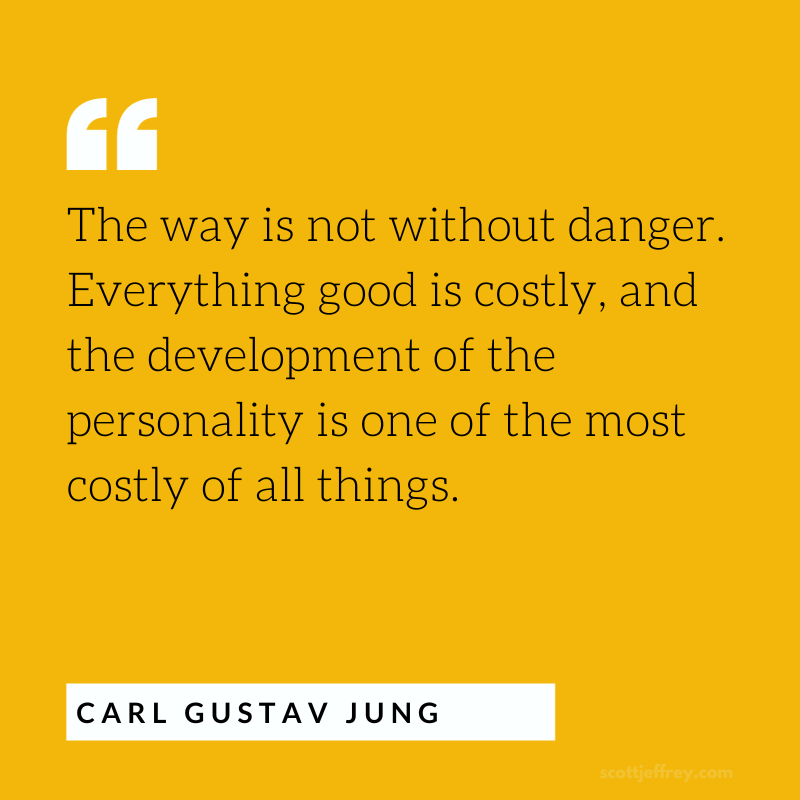
Self-Discovery Activities for Stage 2
What’s strange about Stage 2 is that it can seem like we’re going backward.
While we’re building our personalities and moving toward a vision in stage 1, in this stage, we need to take a step back and explore our past.
Getting to know our past is absolutely essential for deeper levels of self-discovery.
As such, the energetic striving we experienced in Stage 1 now gets replaced by a more self-reflective mind. We now have enough life experience behind us to observe major patterns that we couldn’t see before.
The self-discovery activities in Stage 2 different greatly from Stage 1. Overall, Stage 2 is less about tools and assessments and more about methods and exercises that support one’s inward discovery journey.
Observational Meditation
Many individuals will likely discover meditation in the first stage of their journey. However, the quality and function of meditation take on a different meaning in Stage 2.
Your journey through Stage 2 benefits from a reflective mind and a strong Inner Observer . To gain insight into one’s psyche, it helps to be able to carefully monitor one’s deepest thoughts, feelings, reactions, attitudes, moods, and impulses.
For some, developing this Inner Observer happens naturally. For others, it takes meditative training .
Shadow Work
One of the most remarkable aspects of Stage 2 is that you eventually realize that everything you built up in Stage 1 isn’t entirely accurate.
All prior personality growth and self-development were based on a sense of self (ego construct) that was never closely examined.
To function in the world in early life, we necessarily cut off and dissociate many parts of ourselves that get relegated to our personal unconscious. This creates a split in our psyche that leads to internal tension. This internal tension is the source of our moodiness, emotional instability, neurotic behaviors, and dis-ease .
Think of it like renovating an old house with lead paint. Sure you can paint over the lead with a new “eco-friendly” paint and add new furnishings, but you still have a house with lead paint.
When you reach the Inward Turn, you begin examining what’s been cut off and hidden inside of you.
Every aspect of yourself that was deemed “unacceptable” during childhood was relegated to your personal unconscious. Now, it’s time to bring the unconscious to consciousness. Shadow work becomes an indispensable self-discovery activity at this stage.
See my guide on shadow work here .
Inner Work (Active Imagination & Dream Analysis)
Getting to know your shadow is an integral part of inner work. Inner work is more of a general term for turning inward and examining aspects of one’s unconscious.
Jung used two primary methods for helping his patients harmonize the split within their psyche: dream analysis and active imagination.
Jung saw dreams as a primary means for the unconscious to speak to us—to our conscious minds. So by paying attention to our dreams, we bring to consciousness aspects of ourselves currently hidden from us.
Active imagination is another excellent self-discovery activity. It’s the process of inner dialogue with “parts” within our psyche.
The psyche is filled with a collection of semi-autonomous archetypes that constantly influence our behavior.
In the second stage of our self-discovery process, it becomes necessary to dialogue with or at least become conscious of these various subpersonalities operating within our psyche.
Trauma Release Exercises
In the course of exploring our past, we encounter numerous psychic wounds that need our attention.
Trauma plays a large role in our early development. Addressing this trauma is a necessary aspect of becoming whole.
While mental processes are useful, we also need to address the body directly where this past trauma is stored. (See Dr. Bessel van der Kolk’s The Body Keeps the Score .)
I cover the topic of trauma more deeply in this guide on repressed emotions .
There are a range of methods available to use from David Berceli’s Trauma Release Exercises (TRE) to Alexander Lowen’s Bioenergetic Analysis. All of these self-discovery activities can be highly therapeutic at this stage.
Regardless of the modalities you use for your journey, the key thing is that you release this stored trauma and build a stronger connection to your physical body. This is called body-mind integration. In No Boundary (2001), integral theorist Ken Wilber labeled it the Centaur Level .
Cultivating deeper levels of body awareness is an important, often overlooked, part of one’s journey to self-discovery and healing.
Self-Discovery Activities for Stage 3
In Stage 2, we put our house in order. The more we harmonize the opposites within us, the more internal tension we resolve. We move, slowly and patiently, from fragmentation to greater wholeness.
As this unfolds, we can hold to the Center with greater ease.
From the Center, there’s no need to strive to become anything. Even the growth need of self-actualization begins to take a back seat.
The ego we’ve developed through the first two stages doesn’t go anywhere. But a different quality emerges from the Center. One’s true Self comes forth and gently guides us.
This stage takes us beyond Western psychology and into the realm of mysticism and sagehood .
This third stage is less about self-discovery activities and more about stabilizing one’s mind. Self-inquiry and the closer examination of one’s consciousness become more than just a daily sitting practice, but a continuous way of being.
Becoming versus Being
In the first stage of self-discovery, we’re in the process of becoming . The self-discovery activities above aid us in this developmental process.
Self-development and personal growth are integral to this stage as we do our best to cultivate healthy egos that can thrive in this crazy, chaotic world.
In developing our personalities, we are, as psychologist Abraham Maslow put it, actualizing our potential .
Some of us do this through our careers and vocations. Others do it through cultivating skills and various intelligences out of personal interest.
Eventually, however, there’s a shift in quality in one’s process of self-discovery.
The drive to “become” moves into the background while a quality of beingness wants to emerge. This represents the shift inward that marks stage 2 and reaches fruition in stage 3.
Self-Discovery Through the Three Gunas
In Yogic philosophy, they have what’s called the three gunas or qualities of consciousness:
- Tamas : inertia, inactivity, darkness, and ignorance
- Rajas : activity, passion, desire, energy
- Sattva : purity, knowledge, beingness, truth
Those stuck in tamas (inertia) are unlikely to engage in their self-discovery journey. They sadly remain stuck in their personas. Self-discovery activities are likely uninteresting to them.
Stage 1 occurs when the active quality of rajas is present. Rajic energy is necessary for developing our personalities and fully engaging in life (the process of becoming).
The shift toward sattvic consciousness starts when we embrace our inner world in Stage 2. However, a sattvic state isn’t realized until we arrive home within the Self in Stage 3.
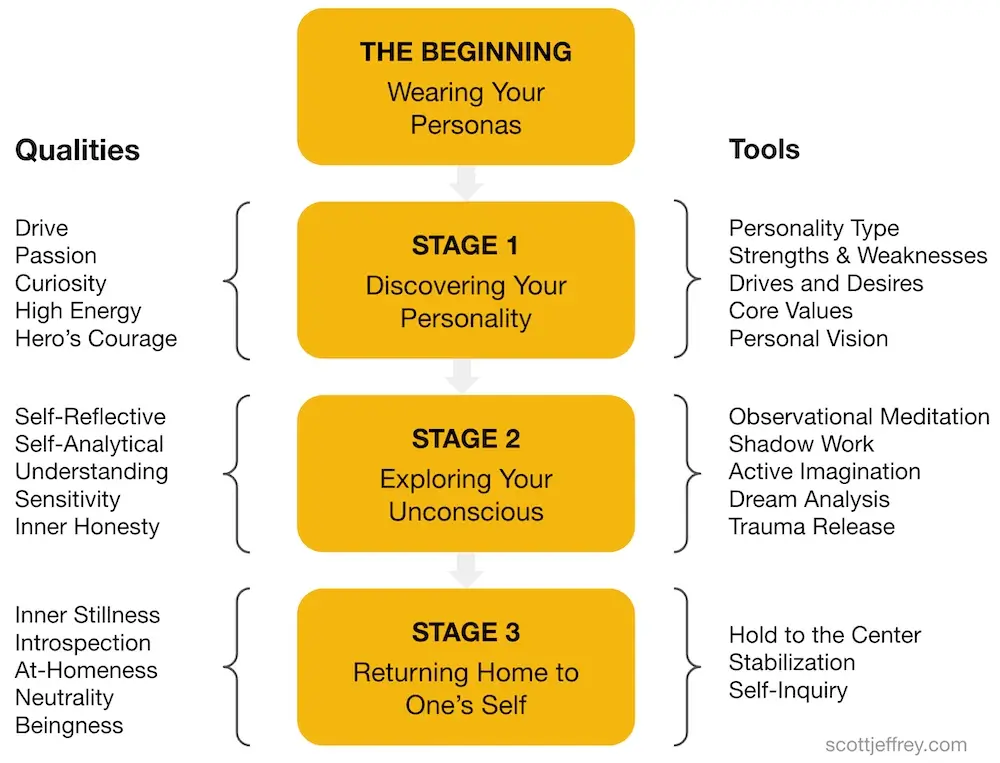
Self-Discovery Activities Roadmap
7 Factors that Hijack Self-Discovery
Keep in mind that self-discovery is a natural process. Sages often refer to it as the “play of consciousness.”
However, many common factors can potentially stall our development. Maslow called this aborted self-actualization . When this occurs, the self-discovery activities we highlighted above either don’t come into play or they hold no meaning.
Let’s take a look at some internal and external factors:
Internal Factors That Can Hinder Self-Discovery
Numerous potential internal hurdles can stall self-discovery. When this occurs, one does not fully engage in self-discovery activities
Here are four potential hurdles:
Early Childhood Trauma
This is probably the most common culprit. A series of psychic scars in early childhood cause various shadow archetypes to take the helm in our conscious mind.
Childhood trauma leads to neurosis like anxiety and depression. Under these conditions, the discovery and awakening process may be thwarted. Instead, life becomes an endless struggle to meet their basic human needs and/or the pursuit of fleeting pleasures.
Trauma often triggers the puer aeternus archetype (eternal child), leading to the Peter Pan syndrome.
However, once brought to consciousness, trauma can be a catalyst for engaging in self-discovery activities.
A Fixed Mindset
Psychologist Carol Dweck’s decades of research presented in her bestseller Mindset (2007) reveals that a fixed mindset, conditioned into us in childhood, can have lasting consequences if not addressed in adulthood.
With a fixed mindset, individuals fear growth and have fundamental blocks to learning in adolescence and adulthood. In contrast, with a growth mindset , one naturally engages in self-discovery activities.
Misaligned Values of Society
The unspoken values of society include image, attractiveness, wealth, material possessions, competition, and “success.” When these are one’s ideal standards, it leads to neurotic behaviors and excessiveness (a feeling of never having enough).
In fact, many people engage in self-discovery activities when they realize how empty these societal values truly are.
As J. Krishnamurti said in Commentaries on Living :
Is society healthy, that an individual should return to it? Has not society itself helped to make the individual unhealthy? Of course, the unhealthy must be made healthy, that goes without saying; but why should the individual adjust himself to an unhealthy society? If he is healthy, he will not be a part of it. Without first questioning the health of society, what is the good of helping misfits to conform to society?
This is why it’s vital to discover your personal values . Your values will naturally help guide you toward self-discovery instead of “following the pack.”
A Strong Drive for Comfort
We all like being comfortable, but for various reasons (two of which are listed above), many individuals avoid risk while clinging to comfort. They have an unhealthy drive for safety and aversion toward growth—the exact opposite of self-actualizing individuals .
An excessive drive for comfort often degrades into addictive tendencies that result in a downward spiral. Endless distractions replace the natural drive for self-discovery activities.
External Factors That Can Hinder Self-Discovery
Here are three common external factors that cause us to withdraw from self-discovery activities:
Financial Restraints
We all have basic human needs and when we have difficulty meeting these needs, it creates a great deal of tension.
For example, how are you supposed to invest energy and attention into learning about your personality, when you’re worried about paying rent next month?
You don’t need to be affluent to pursue self-discovery, but it does help to have your “house” in order first. You just need an internal space for psychological safety where you are calm enough to pursue self-discovery activities.
An Unsafe Environment
Humanistic psychologist Carl Rogers points out in On Becoming a Person (1995) that psychological safety in our environment is an important condition for creativity and the development of positive mental health.
This lack of psychological safety can be due to an abusive relationship, socio-economic conditions, or some other factor. These days, just turn on the news: external psychological safety seems to be in short supply.
A Disempowering Peer Group
Being surrounded by destructive individuals or people with mental illness (including narcissism) can make it challenging to pursue self-development. Your peer group can act like “crabs in a bucket,” pulling you down if you try to get out.
This external factor is more of a concern at the early stages of discovery when you’re first building momentum.
When individuals first engage in self-discovery activities, for example, they often search for other like-minded individuals. Others, at least for some time, go it alone.
Self-Discovery: A Pathless Path
Ultimately, the path you take to self-discovery will be unique to you.
The above stages and self-discovery activities are mere guidelines, designed to capture the essence of the journey home.
Remember, too, that it’s normal to slide off your path at times and to experience major setbacks along the way. Tests, trials, and tribulations are a part of the journey.
As Jung often pointed out, the way is not without its dangers. As soon as you leave the conventional, ordinary world and enter the “special world,” you’re on your own. While this can be terrifying, it can also be liberating.
It’s only when you step back and view this self-discovery process from a 10,000-foot view that you can fully appreciate the play of consciousness expressing itself through a myriad of forms representing all of us. What a peculiar thing.
Travel safely. Or don’t.
Either way, stay alert.
Peak Experiences: A Complete Guide
The Four Stages of Learning Any Skill
A Practical Guide to Joseph Campbell and the Hero’s Journey
About the Author
Scott Jeffrey is the founder of CEOsage, a self-leadership resource publishing in-depth guides read by millions of self-actualizing individuals. He writes about self-development, practical psychology, Eastern philosophy, and integrated practices. For 25 years, Scott was a business coach to high-performing entrepreneurs, CEOs, and best-selling authors. He's the author of four books including Creativity Revealed .
Learn more >
Great Information! Thank YOU! BARB!
You’re most welcome, Barb.
Return to hOMe. Be Blessed.
Guía extensa, pero iluminadora. En mi caso, es un excelente enrutador, ya que me aclara situaciones que me agobian y me hacen detenerme sin rumbo definido. Esta guía me hace reflexionar y decidir qué camino debo seguir. Gracias Scott por tu valioso apoyo.
Sure thing, William.
Returning to Home and Self! The path is not without danger and suffering but it will be liberating. And I know I can do it.
Travel safety or not. Either way stay alert.
Thanks Scott a lot! Your writings and wisdom is making a lots of difference in the world, at least in my world.
Thank you for the feedback, Niimka.
Great to hear that the material is making a difference for you.
I have a a clarification regarding the content of this article , however, I might reference other articles on which my thought process is based. Please bear with me, as I try to make clearer sense of the “Sage Stage”.
In my view and based on experience/inner work it seems relevant to me to see three types of consciousness. Namely, Superconscious, Conscious, Subconscious, Unconscious.
In this article does the Sage stage refer to the “Consciousness arising from a leaning towards a Superconscious influence on an individual or is it coming from an archetypal “Sage” arising from the Subconscious/Unconscious?
I perceive inner work more aligning with Superconscious/Inner Guidance rather than Archetypal/SubConscious/Unconscious.
To seems to me, Spirit can interact with Soul-Ego(Human) only from a place of SuperConscious.
Please let me know how you perceive our internal construction that navigates self-discovery in relation to evolving consciousness? Thank you!
Personally, I don’t use terminology like “superconscious.” But I also don’t perceive that third stage in terms of a “Sage Stage.” I referenced “sagehood” as it links to the Sage archetype guide that’s relevant here. From a purely Jungian perspective, that’s accurate.
However, I’m not Jungian. To me, the Spirit isn’t an archetypal image as it is to Jungians.
“Returning home” doesn’t involve images. Navigating through images is the defining characteristic of Stage 2.
“Please let me know how you perceive our internal construction that navigates self-discovery in relation to evolving consciousness?”
So this is probably what may be different in our understanding. The transpersonal literature speaks about “evolving consciousness,” but wholeheartedly don’t agree with this. Sure, there’s the development of the ego. That’s why there are stages. But the “Return Home” is not evolutionary or developmental; it’s a function of stripping away what the Taoists call “mundane conditioning” to return what was there all along (hence, the “Original Spirit” or “Original Nature”).
Bringing order to the psyche (Stage 2) helps reduce mental illness. With less mental illness, there’s less neurosis. With less neurosis, the mind is more still. When the mind is still, one can be. If one can “just be” long enough, one’s energy stabilizes. As one’s energy stabilizes, the Spirit returns.
In this way, Stage 3 is more “alchemical” — not evolutionary or developmental.
Yes, I can now see the difference in views.
I had a very unique and personal experience in getting to come to know about the work of Sri Aurobindo. Although I am Indian, I did not know anything about him at all and his work on human evolution. It was through a personal sequence of synchronistic events in the last few years that were totally unexplainable that I came to know of him. In exploring his work I found a deep connection with my own personal “evolution of consciousness” making sense. The way he describes the process of moving from ego-centric mind to a higher mind has been very resonant with me at a personal level.
It fits accurately even within what you refer to as “sagehood”.
Because my personal experience is very valuable to me, I might like to perceive it as my consciousness is continuously evolving. Offers me the necessary motivation to stay on track even though inner work is hard.
Thank you for the clarifications.
It seems that the process on inner work being so non-linear in nature adequately covers the areas of de-conditioning and addressing neurosis as long as I stay dedicated to the discipline needed for inner work. It seems like the end is similar but being addressed in different ways.
To clarify, I did not suggest that “inner work” is non-linear. Sure, the psyche can be messy, and establishing order doesn’t necessarily follow a step-by-step process. Stage 2 of the self-discovery process is where inner work takes place. Stage 3 is more about contemplative practices that enable stabilization.
“The way he describes the process of moving from ego-centric mind to a higher mind has been very resonant with me at a personal level.”
Sure. But what I’m saying is that it’s incorrect to call this “evolution.” It’s the wrong word.
In the way I view inner work, I am considering messy and non-linear to be similar. In my mind it is similar to “not a step-by-step process”. I used the word non-linear to imply not in a straight line, sometimes straight, other times with repeats and new situations to navigate and explore…I see this as the “messy psyche” I am trying to “order” at some level.
The Indian word “Sadhana” that seems to align with Spiritual Contemplative practice to me is really what is most useful to me (as I have mentioned before I have a strong inclination towards spiritual contemplation). It could be different from other contemplative practices so sure. What is achievable through Sadhana is difficult for me to put into a few words. It is a state of being to which stabilization is definitely arriving. Also I’m over-simplifying everything here just to be concise.
The use of the word evolution is present in his literature aligning with a progressive movement. I think “awakening” applies here too. Is there a better word to describe the process?
“The Indian word “Sadhana” that seems to align with Spiritual Contemplative practice to me is really what is most useful to me”
Yes, Sadhana is the pathway of Stage 3.
“What is achievable through Sadhana is difficult for me to put into a few words. It is a state of being to which stabilization is definitely arriving.”
In the Indian tradition, especially the nondual schools, the focus is primarily on a transformation of consciousness — transcending the identification with the body-mind organism and moving beyond the “I am” (primary Maya). In the Taoist tradition, especially the Southern Reality School, the emphasis is on the stabilization of the energy within the body first. Then, they move to a transformation of consciousness.
“The use of the word evolution is present in his literature aligning with a progressive movement. I think “awakening” applies here too. Is there a better word to describe the process?”
Transformation and development both work.
Thank you for your time to clarify my questions and comments. It is very much appreciated.
Is the practice that is proposed by Jung for working with the unconscious mind “Active Imagination” suitable for all individuals?
The reason I ask is that some people have a predisposition towards “fantasy thinking” that utilizes imagination actively (not is terms of Jungian Active Imagination).
What I mean by fantasy thinking could be divided into two kinds, what I refer to as “Magical thinking, that goes like : I wish things would magically happen” or “Wishful thinking which is a active conscious thought process involving romanticizing reality, looking at life through rose-colored glasses or in some cases even dark fantasy that involves getting back at someone for wrong doing (even if it be in the realm of thought). The first two is something I seem to indulge in more easily. But I know people around me who indulge in (dark fantasy/more violent type) the later frequently. What I have described in this paragraph is a conscious active mental process.
I would say that based on knowing and studying myself as well as studying and observing others, some types (Enneagram in particular) have a greater predisposition towards fantasy thinking.
In fact I could even say that some “guided visualizations” that take people on mental journeys fall into a form of fantasy thinking process, that are more unproductive than useful. I find such guided visualizations very ungrounding and airy experiences. Please correct me if I wrong.
Makes me wonder if this is why hypnosis that takes a creative-imagination driven format with its practical applications works well only for some people.
Since active imagination is a way to tap into the unconscious would a person prone to fantasy thinking feel more ungrounded by engaging in it, without a clear sense of whether they have shifted into pointless imaginations or real useful work with their unconscious “parts”?
Is there a grounding practice that accompanies active imagination would support an individual to stay on track with “active imagination” vs. getting lost in imaginary conversations with parts (that they might be accustomed to given their fantasy-driven tendencies) that might produce useful, meaningful and desired results that tap into their psyche?
I hope my questions and background I have provided is clear enough.
Thank you for your time and consideration.
“In fact I could even say that some “guided visualizations” that take people on mental journeys fall into a form of fantasy thinking process, that are more unproductive than useful. I find such guided visualizations very ungrounding and airy experiences. Please correct me if I’m wrong.”
Yes, I generally discourage guided visualizations, despite how popular they are. Guided instructions can be useful as a learning aid, but guided visualizations serve little value in my experience.
“Since active imagination is a way to tap into the unconscious would a person prone to fantasy thinking feel more ungrounded by engaging in it, without a clear sense of whether they have shifted into pointless imaginations or real useful work with their unconscious “parts”?”
Not necessarily. Someone prone to fantasy may find active imagination very instructive as it can add a useful structure to their fantasies.
“Is there a grounding practice that accompanies active imagination would support an individual to stay on track with “active imagination” vs. getting lost in imaginary conversations with parts (that they might be accustomed to given their fantasy-driven tendencies) that might produce useful, meaningful and desired results that tap into their psyche?”
Yes. See these two guides: https://scottjeffrey.com/how-to-ground-yourself/ https://scottjeffrey.com/center-yourself/
Hi Scott, I’ve been considering the statement you mention “Not necessarily. Someone prone to fantasy may find active imagination very instructive as it can add a useful structure to their fantasies.” As someone who has not benefited in anyway in indulging in fantasy, I have not been able to use many of the practices that have been outlined by Jung. I don’t mean to dismiss or disqualify the validity and use of the practices…it might be extremely useful for certain individuals. I think I am very driven to focus on reality as it occurs and then try to connect it to fields of study. There is a neat distinction made by John Vervaeke (he may not be the originator), between “imagination” and “imaginal”. A website definition of this distinction goes as follows … Here it is important to differentiate between the imaginary (fantasy) and the imaginal, with the latter being seen as a crucial bridge between subjective and objective experience, as well as between perceptual and conceptual domains.” … It seems to me that Inner Work aligns well with “Imaginal” rather than “Imagination”. Personally, inner work continues to breakdown the hold of fantasy in my life…which continues to make inner work very useful. Thank you for giving me the opportunity to think through this via this discussion.
To clarify, inner work and active imagination are not about engaging in fantasy as such. What you’re doing is actively engaging in dialogue with semi-autonomous subpersonalities within the psyche. There’s no need to get hung up on definitions of “imagination.” You don’t have to “imagine” these inner voices. They are already there. It’s just a matter of whether or not you tune into them.
Also to clarify, inner work is not the same thing as sadhana. With inner work, you engage with the images in the psyche. With sadhana, you don’t. That is, Eastern practices are focused on going beyond the images (because, as you observed, focusing on the images can lead to fantasy — i.e. delusion).
The integral movement (including transpersonal psychology) places inner work practices at a lower stage as it relates more specifically to the personality and contemplative practices (sadhana) at a higher stage of development. Overall, I would agree with this structure.
Thank you for the clarifications Scott.
It definitely sounds more honest to tune into inner voices. I can relate to that. I don’t think I make a clear distinction for myself about the stages of development. I tend to use a broad term as “Inner Work” that is simply ongoing, placing awareness onto various aspects of my life.
I don’t even have any specific affiliation with people who call themselves “integral” or “transpersonal psychologists”. When something resonates and seems to match something in my reality it offers a little more clarity. Thank you for sharing your time and guidance with me.
Sure thing, Roopa. I also don’t have any affiliations with these various groups. I mentioned integral here in this context because before this “fifth wave of psychology” there wasn’t really a language or understanding to differentiate these different schools of thought — both East and West — and the levels of development they represent. And without this differentiation, there tends to be a lot of internal confusion. This type of differentiation itself is a function of developing cognitive consciousness.
Scott, your portrait shows you becoming more distinguished, retaining the handsomeness.
Forgive me if I seem to be repeating what you have said. I think writing it down helps me understand.
“Stage 1: Discovering Your Conscious Self (Personality)”.
Is this how people see you? Is this the unconscious that acts in your conscious? Is this the personality enneagram types and are they archetypes?
So far, I’ve asked about the persona as an unconscious part. Is it possible for our persona to be consciously developed? As a boy I emulated my father, then later years became an image (perhaps the persona mask). Can I say that I made my image and is this my archetype making me believe it’s me? What archetype I don’t know, you might have an idea which it is? Thank-you.
How people see you is a function of numerous factors that don’t necessarily align with Stage 1.
Yes, the Enneagram types are ultimately expressions of archetypes as I explain here: https://scottjeffrey.com/archetypes-list/
“Can I say that I made my image and is this my archetype making me believe it’s me?”
Not really. No. The psyche is a collection of archetypes — not just one. And there are a host of factors involved here.
Also, you don’t really consciously develop your persona. It’s more of a reaction to your environment.
That said, we all do learn by observing the behavior of those around us — especially those we project onto like parents and other authority figures.
My understanding of the persona; is an Image we relate to others. Do you think we would rather be our true personality to others?
I think the persona is not far off compared with our personality. As you can see from this quote”The list shows how likely it is that you are each enneagram type.
Most people will be the type at the top of the list, however, your actual personality type might be somewhat lower in it (usually it’s in the top 3).
This is from an enneagram test, which tells my we are not willing to show our true personality. Don’t you think we would be more contented with ourselves if we were able to incorporate the persona with personality? Thank-you.
The social mask is something that’s subconsciously created as a response to one’s environment. It’s a reaction.
One’s true personality is not known until the individual builds consciousness via processes like shadow work. Until then, they are divorced from many qualities about themselves (positive and negative) and engaged in self-deception. The goal of individuation is to bring the individual to a sense of wholeness.
The persona falls away during this process.
Thank-you Scott for your patient reply. However, from the quote on the enneagram test “Most people will be the type at the top of the list, however, your actual personality type might be somewhat lower in it (usually it’s in the top 3)” and your comment quote “One’s true personality is not known until the individual builds consciousness via processes like shadow work”.
There seems to be a conflict, are you suggesting the enneagram test people are wrong?
Perhaps there is not a conflict, I may be seeing the comments in a black and white perspective. I would like you to detail both quotes for me. Thank-you.
There’s no conflict here. The Enneagram is a typing system. Like any personality typing system, it can only highlight general predispositions of particular “types.” If you read any good book on the Enneagram, for example, you’ll resonate with many of the type descriptions. That’s why many individuals have difficulty zeroing in on their type. Their singular type represents a “center of gravity” — it’s not codifying who they are. Plus, there are nine levels of development for each type — from least healthy (9) to healthiest (1). Most people are in the mid to lower range (unhealthy to average mental health). Finally, as you develop your personality through inner work, you actually move toward a different type in the Enneagram (“path of integration”). Ultimately, the more one moves toward individuation the less any of these types become relevant. That’s part of the reason Jung didn’t approve of Myers-Briggs (MBTI). In his view, it missed the point of what psychological types represent.
Ilike the expression you used “center of gravity”. You have answered where the enneagram fits in to the individuation process. It does seem useful to consciously stay in your enneagram type. Thank-you. Perhaps you might elaborate on the phrase “center of gravity” …
“Center of gravity” is a term used in the developmental literature. There are all kinds of developmental stage models, including the Enneagram’s 9 levels, Loevinger’s ego development, Erikson’s psychosocial development, spiral dynamics integral, Maslow’s needs, etc. It’s a mistake to pigeonhole someone at a certain stage of any model. It’s more accurate to say that a person’s “center of gravity” is at a particular stage as it reflects the reality that we are complex beings with many parts. For example, with spiral dynamics, a person’s center of gravity value structure may be “green” (sensitive self) but that doesn’t mean they don’t they don’t also express orange (achievement) and blue (right-wrong morality) under different conditions.
Session expired
Please log in again. The login page will open in a new tab. After logging in you can close it and return to this page.
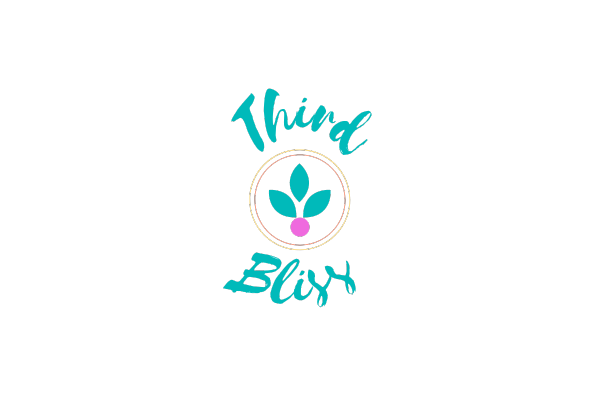
The value of self-discovery + tips to help you succeed on your journey.
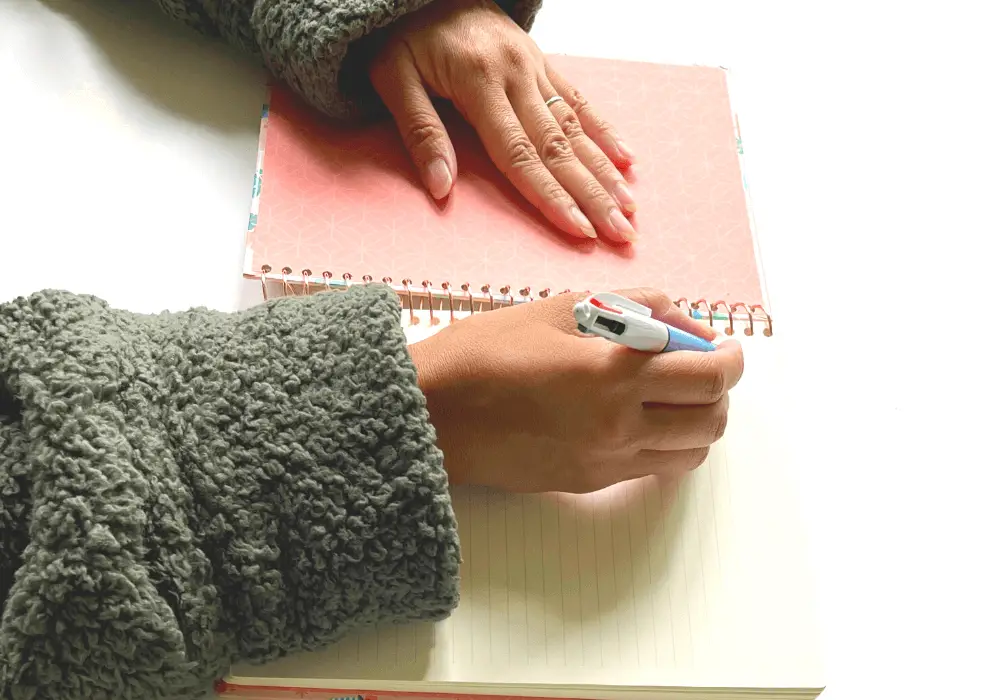
Written by ( author bio ):
Christine Songco
Self-discovery is important because it can be a very powerful tool to help you live a life that feels more authentic and meaningful.
In my experience, going on a self-discovery journey meant being completely honest with myself.
It also meant:
- being more self-aware.
- being more intentional.
- letting go of limiting beliefs.
- adopting new ideas that align with my soul.
- uncovering my authentic self.
- and so much more.
Self-discovery doesn’t come naturally to everyone.
If you’ve never been on one before, I’ll share with you my tips and tools to help you succeed in your self-discovery journey.
I’ll cover why a self-discovery journey is important as well as what it means, how it benefits you, how to succeed on your road to self-discovery, and so much more.
What self-discovery means.
According to the Merriam-Webster Dictionary, self-discovery is defined as the act or process of achieving self-knowledge.
The American Psychological Association describes self-discovery as the process of searching for and finding one’s unique self or identity.
For me personally, self-discovery meant having more clarity and awareness about myself.
One of the reasons why I embarked on a self-discovery journey was being clueless about who I was when I turned 40.
Even though I had a great job and a comfortable life, I felt lost and afraid.
Those were just a few of the factors that led me on the road to self-discovery.
Factors that lead to self-discovery.
Fear was just one of the factors that led me down the road of self-discovery.
When I started to pay attention to the reasons why I felt lost and scared, it created a trajectory in my life that felt more aligned with who I truly am.
I felt more connected to my past and the world around me.
It made me realize how everything was connected to each other and how it affects me on a personal level.
Because I knew more about myself, I was able to step out of my comfort zone, face my fears, and overcome them.
New ideas and opportunities opened up and my life felt more intentional and less haphazard.
Here’s a list of factors, or reasons, that can lead a person down a path of self-discovery. See if any of them resonate with you in the table below.
Knowing my true self changed my life for the better in so many ways, which is why it’s important to discover who you really are.
The importance of self-discovery.
“It’s important to discover who you really are because if you don’t know yourself, you can feel lost, especially if you’re starting out in life.”
In the book, A Journey of Self-discovery and Personal Development, the author Lisang Nyathi wrote,
“ To understand yourself as a young person entails to knowing your interest, passion, desires and aspirations. Young people should know what they like and the things they want to do, achieve, attain and as well as who they want to be in future. This will enable them to pursue their dreams to the right direction with vision. ”
Knowing yourself can give your life more direction and purpose. It allows you to navigate your way through life with more focus and clarity.
You don’t have to be a young person though to go on a self-discovery journey.
In my own experience, you can embark on a self-discovery journey, even if you’re well into your adult years.
When I turned 40, I was working almost full-time while raising 3 kids with my husband.
My work was great and it paid me very well, so I was living very comfortably. But something inside of me wasn’t.
Instead of exploring the feeling of discomfort, I ignored it. I didn’t realize it at the time that I had fallen into the trap of comfort.
There’s nothing wrong with comfort, but it hampered my creativity and growth.
I felt lost and everything was changing in ways I had never seen or felt before.
The old coping mechanisms that worked when I was a young adult were failing miserably.
It felt like everything in my life was changing too fast; my mindset, values, emotions, and even my physical capabilities.
Yet at the same time, I was reluctant to leave my cushy life.
It took a serious health scare and a couple of medical challenges to give myself permission to discover the real me.
When I embarked on a self-discovery journey, I:
- was more open and honest with myself
- explored my life with more curiosity
- opened up my creativity
- uncovered my old beliefs
- adopted new ideas
- let go of limiting beliefs
During this time of self-reflection and exploration, I felt like a creature transforming inside a chrysalis.
It was a period of tremendous growth and change that was both enlightening and challenging.
Though I wouldn’t say my journey completely transformed me because I still carry some of my old beliefs and values, it did change the way I perceive myself and live my life.
I have a deeper understanding of who I am.
By discovering the real me, I was able to:
- Connect and align with my true self.
- Create better boundaries.
- Embrace imperfection.
- Set priorities.
- Accept me for who I am.
- Gain self-confidence.
- Find my purpose and passions.
- Continue to grow and change.
- Use my time and energy more efficiently.
Benefits of self-discovery.
Self-discovery can benefit you in many ways.
According to a study from the European Journal of Psychology, having a sense of self-connection can have a positive effect on your mental health and well-being.
In the book, “ The Midlife Self-Discovery Workbook ”, the author & licensed counselor, Lynn Louise Wonders, wrote that self-discovery allows you to reflect
“on past experiences to understand how you arrived where you are and to inform how you will forge a meaningful path moving forward.”
Here are examples (in the table below) from the book about the ways you can benefit from self-discovery.
Knowing who you are is beneficial but the journey of self-discovery is not always a clear and smooth path.
Why self-discovery can be challenging.
Self-discovery can be challenging because it takes time and requires honesty.
Here are other reasons why self-discovery can be difficult.
- You might experience difficult emotions.
- Others may not like the fact that you’re changing.
- You might be afraid of discovering something about yourself you don’t like.
- It takes too long.
- It requires too much effort.
- You’re afraid that it will be a waste of time.
Self-discovery can be pleasant for some and uncomfortable for others; it can be a short sprint for some and a long marathon for others.
My personal journey of self-discovery took a while and wasn’t a clear & straight line. My path looked more like a zigzag line.
I encountered all of the challenges I listed above and I experienced imposter syndrome once I thought I had found myself.
I had doubts that I discovered the real me and questioned whether or not I had made the right choices.
For all of its potential pitfalls, I want you to know that discovering your authentic self is worth the effort.
I also want you to know that all of the feelings that you might experience, whether positive or negative, are valid.
You can always ask someone to help you out, like a trusted friend or a professional.
If you’re ready to begin your self-discovery journey right now, read my tips and tools in the next section to help you get started.
Starting a self-discovery journey.
A self-discovery journey starts with asking the question, “Who am I?”
When I started my own self-discovery journey, I thought that this question would be simple to answer.
But when I began to write, I paused. My brain actually froze because when I thought about it, I didn’t really know who I was.
So instead, I turned to books to help me discover more about myself and learned that there are so many ways to start a self-discovery journey.
Here are 5 powerful questions that I learned over the years to help you start your own self-discovery journey.
- What do I want to change about myself?
- Why do I want to change this?
- What is holding me back from taking the next step?
- How do I want to move forward?
Just remember when you’re answering these questions to be completely honest with yourself because it will make the process smoother.
If you feel unpleasant or uncomfortable at any point, you can always stop and come back to them later when you’re ready.
To help you succeed with your self-discovery journey, I’m going to share some of my favorite tips to add to your self-discovery toolbelt.
11 Tips to help you discover yourself.
Here are my tips to help you succeed on your self-discovery journey .
1. Increase your awareness.
Knowing yourself on a deeper level can help you discover things that you may not have been aware of.
As I mentioned before, self-discovery helped me become more aware of myself.
It also helped me become aware of the complex layers of my experiences, make sense of my past, connect deeper to myself, and create a life I truly love.
2. Journaling freestyle.
Journaling is a great way to learn more about yourself. The key is to stay consistent.
One of my favorite ways to journal is a method I developed from the book, “The Artist’s Way.”
I set a timer in the morning for 5 minutes and then write down whatever flows out of my head without filtering, thinking, or judging what I am writing.
Then I go back and look at what I’ve written to help me process my thoughts, reflect on what I wrote, and learn more about myself.
If this sounds like too much work, you can do journal prompts, and I will explain what they are in the next section.
3. Journal prompts.
Journal prompts are another way to discover more about yourself.
They’re usually exercises that are in the form of questions or prompts that you answer.
Here’s an example of a self-discovery journal prompt:
What is your favorite thing to eat and why?
If you need some help with journal prompts, I have a guide you can download and print, which is full of prompts to help you discover more about yourself.
Just fill out the form down below and click.
4. Learn your likes and dislikes.
A simple way to discover more about yourself is to make a list of your likes and dislikes .
Just grab a piece of paper and make two lists. One for your likes and another for your dislikes.
Here’s an example to help you get started.
5. Become more self-aware.
Being self-aware is being present with yourself. This might sound simple in theory but this is a practice that can take time to build.
My self-awareness practice began when I was able to observe myself while talking to someone.
While I was talking to this person, I noticed that I was trying so desperately to get her to see things my way and gain her approval.
As soon as I recognized this, I stopped. I learned a valuable lesson about self-awareness and self-discovery in “real time”.
I can either act on what I’m feeling in the moment and pay the consequences later.
Or I can create a space of awareness in the present moment so I can discover possibilities that are more conducive & effective to myself and those around me.
The best way to do this, I discovered, is to pause, take a deep breath, and allow whatever comes up to pass.
6. Practice mindfulness.
Mindfulness is a type of awareness practice that is rooted in Buddhism and Hinduism.
The main function of mindfulness is to help you practice non-attachment.
Non-attachment is being in the present moment without attaching to thoughts, feelings, or sensations.
Like self-awareness, mindfulness takes time and practice, but it’s worth it because you can discover so much about yourself.
Mindfulness can help you see past the layers and filters that you have learned & attached to over your lifetime.
You can see yourself more authentically and notice that you are not your past, actions, behaviors, and what other people think or say about you.
7. Find your identity.
One of the best ways to discover more about yourself is to find your identity .
Your identity is made up of a multitude of things because it starts forming from the day you’re born.
I’ll use myself as an example. I am a working mom who lives in Southern California. Of course, this is just a tiny snippet of my identity.
To go deeper into your identity, you can go all the way back to when you were born.
You can add things like the people who raised you, where you were born, your gender, race, group, hobbies, job, where you live, your beliefs , and your personal values .
8. Ask someone to describe you.
If you want to discover more about yourself, sometimes it’s easier to ask someone else to describe you.
The reason is, sometimes it’s hard to see yourself for who you really are.
Other people might know you better than you know yourself.
If you’re brave, you can start by asking a family member or a friend to describe you honestly.
9. Start a meditation practice.
Meditation might sound intimidating but it’s a great tool to help you discover yourself.
People think that meditation is about clearing your mind or calming yourself down.
Meditation is a discipline that trains your mind, body, and spirit.
Like self-awareness and mindfulness, it helps you be more present with yourself without attaching emotions or thoughts.
It can help you connect to yourself and gain more clarity about who you are.
There are so many ways to practice meditation but my favorite method is to sit in a quiet room for 5-10 minutes and pay attention to my breath.
Every time my mind wanders, I bring my attention back to my breath.
I do this over and over until my timer goes off.
If you’re just starting out, you can download my free 5-minute breath meditation down below.
10. Consider the 8 essential areas of the self.
Learning the 8 areas of life can shed light on parts of yourself that you may not have been aware of.
- Physical : your physical body.
- Emotional : emotions and feelings.
- Social : your community and social circle.
- Financial : your wealth and money.
- Spiritual : your higher self.
- Mental : your mind and thoughts.
- Occupational (or Vocational): what you do for a living.
- Environmental : your personal space and where you live.
The reason why you want to think about these areas is that they can help you create a more balanced life.
It’s a good reference point to help you prioritize the areas that need the most attention without neglecting the other essential areas of your life.
11. Own yourself.
I mentioned before that you might experience imposter syndrome on your self-discovery journey.
You might also have doubts about whether or not you found your true self.
I’ve been on a self-discovery journey for a long time and sometimes I’m afraid I haven’t found my true self or have doubt that I have it in me to become the person I want to be .
If you’ve come to this point in your journey, congratulations, you are on the right path.
Each feeling you have on your self-discovery journey is valid.
What you don’t want to do is jump on every negative feeling that comes up, become attached to them, and limit yourself.
I know it’s easier said than done because if you’re like me, you have beliefs that limit you .
With practice, however, you can break the cycle and try owning yourself.
Owning yourself is accepting yourself for who you truly are, and staying connected to your inner self.
It’s easier said than done if you’re like me and you have beliefs about yourself that keep you stuck.
With practice, it does get easier and you’ll find out that taking the risk to own yourself was worth it because you are worth it.
More ways to discover yourself.
If you want more tools to help you discover yourself, check out my article, How to start a self-discovery journey with 5 powerful questions .
I dive deeper into the “5 powerful questions to ask yourself”, that I mentioned in the section, “Starting a self-discovery journey.”
If you like to journal, but don’t know where to start, I have a printable pdf with self-discovery questions that you can answer to get to know yourself on a deeper level.
If you want a guide to help you on your self-discovery journey, I have some self-discovery journal prompts that will help you whether you’re starting out or you’ve embarked on a self-discovery journey for the nth time.
I hope you found my guide to understanding the importance of self-discovery helpful. Wishing you the best on your self-discovery journey!
Leave a Reply Cancel reply
Your email address will not be published. Required fields are marked *
Save my name, email, and website in this browser for the next time I comment.


Authenticity
What "finding yourself" really means, seeking your true self is a journey of self-discovery and self-awareness..
Posted September 1, 2023 | Reviewed by Davia Sills
- When someone knows who they are and what they want, they can make choices that are more authentic.
- It is often helpful to identify harmful thinking and behavioral habits and replace them with healthier ones.
- Building meaningful relationships and embracing change can help life feel more fulfilling.
Finding yourself is important because it is the key to living a fulfilling and authentic life. When you truly know yourself, you can make decisions that align with your values, passions, and purpose. It's about understanding who you truly are, embracing your unique story, and living authentically.
But what does "finding yourself" really mean?
Embracing your story
Your story is what makes you unique and powerful. Take the time to reflect on your life experiences, both positive and negative. What have you learned from them? How have they shaped you?
Embracing your story means accepting every part of it, even the challenging moments. By doing so, you can gain a deeper understanding of yourself and what the universe has in store for you.
Living authentically
When you find yourself, you can live authentically, being true to who you are at your core. This means embracing your strengths, accepting your weaknesses, and showing up in the world as your genuine self. Living authentically allows you to attract people and experiences that align with your true essence.
Noticing problematic thought patterns
We all have thought patterns that hold us back. Take a moment to identify five problematic thought patterns that frequently recur in your life. Explore how these patterns translate into beliefs and behaviors. Be specific and give examples. Understanding the impact of these patterns on your thinking and life is crucial for creating change.
Discovering your purpose
Finding yourself helps you uncover your purpose in life. By understanding your values, passions, and unique gifts, you can identify the path that brings you the most fulfillment and meaning. Your purpose gives you a sense of direction and guides your decisions, leading to a more purposeful and satisfying life.
Replacing old patterns with new ones
Once you've identified your problematic thought patterns, it's time to replace them with new, empowering ones. Think about what new behaviors or thoughts can replace the old ones. This step requires conscious effort and practice. By consistently implementing these new thoughts and behaviors, you'll start to see a shift in your life.
Building self-confidence
When you know who you are, you develop a strong sense of self-confidence . You become more self-assured in your abilities, decisions, and choices. This confidence radiates in your interactions with others and empowers you to take risks, pursue your dreams , and overcome challenges.
Making it about others
One powerful way to find yourself is by shifting your focus from yourself to others. When we constantly worry about how we are perceived, our light can feel dimmed. Instead, focus on how you want to be remembered and the impact you want to have on others. By making it about others, you'll feel a sense of purpose and invincibility.
Creating meaningful relationships
Finding yourself allows you to attract and cultivate meaningful relationships. When you are authentic and true to yourself, you naturally attract people who appreciate and accept you for who you are. These relationships are based on genuine connections and mutual understanding, leading to deeper and more fulfilling connections.

Embracing change and growth
Finding yourself is an ongoing process. Embrace change and growth as you navigate through life. Be open to new experiences, challenge yourself, and step out of your comfort zone. Remember, it's in the moments of not knowing and feeling lost that our true potential emerges.
Making aligned choices
Knowing yourself helps you make choices that align with your values and aspirations. You become more aware of what truly matters to you and can make decisions that support your personal growth and well-being. This leads to a greater sense of fulfillment and satisfaction in life.
Finding yourself is a deeply personal and unique journey. It may take time, but by embracing your story, replacing old patterns, and focusing on others, you'll start to uncover your true self. Seek support from loved ones, mentors, or even professional guidance if needed. Embrace the adventure of self-discovery and live your truth.
Remember, finding yourself is a continuous journey of self-discovery. It's about exploring, learning, and evolving as you navigate through life. Embrace the process, be patient with yourself, enjoy the adventure of uncovering your true self, and know that you're not alone. We're all trying to find ourselves.

John Kim, LMFT , pioneered an online coaching movement called Lumia Coaching years ago when he started working in unconventional ways. He continues to ride his motorcycle to sessions all over LA, meeting clients in coffee shops, gyms, on hikes. He's a published best selling author and speaker.
- Find a Therapist
- Find a Treatment Center
- Find a Psychiatrist
- Find a Support Group
- Find Online Therapy
- United States
- Brooklyn, NY
- Chicago, IL
- Houston, TX
- Los Angeles, CA
- New York, NY
- Portland, OR
- San Diego, CA
- San Francisco, CA
- Seattle, WA
- Washington, DC
- Asperger's
- Bipolar Disorder
- Chronic Pain
- Eating Disorders
- Passive Aggression
- Personality
- Goal Setting
- Positive Psychology
- Stopping Smoking
- Low Sexual Desire
- Relationships
- Child Development
- Self Tests NEW
- Therapy Center
- Diagnosis Dictionary
- Types of Therapy

At any moment, someone’s aggravating behavior or our own bad luck can set us off on an emotional spiral that threatens to derail our entire day. Here’s how we can face our triggers with less reactivity so that we can get on with our lives.
- Emotional Intelligence
- Gaslighting
- Affective Forecasting
- Neuroscience

How it works
Transform your enterprise with the scalable mindsets, skills, & behavior change that drive performance.
Explore how BetterUp connects to your core business systems.
We pair AI with the latest in human-centered coaching to drive powerful, lasting learning and behavior change.
Build leaders that accelerate team performance and engagement.
Unlock performance potential at scale with AI-powered curated growth journeys.
Build resilience, well-being and agility to drive performance across your entire enterprise.
Transform your business, starting with your sales leaders.
Unlock business impact from the top with executive coaching.
Foster a culture of inclusion and belonging.
Accelerate the performance and potential of your agencies and employees.
See how innovative organizations use BetterUp to build a thriving workforce.
Discover how BetterUp measurably impacts key business outcomes for organizations like yours.
A demo is the first step to transforming your business. Meet with us to develop a plan for attaining your goals.

- What is coaching?
Learn how 1:1 coaching works, who its for, and if it's right for you.
Accelerate your personal and professional growth with the expert guidance of a BetterUp Coach.
Types of Coaching
Navigate career transitions, accelerate your professional growth, and achieve your career goals with expert coaching.
Enhance your communication skills for better personal and professional relationships, with tailored coaching that focuses on your needs.
Find balance, resilience, and well-being in all areas of your life with holistic coaching designed to empower you.
Discover your perfect match : Take our 5-minute assessment and let us pair you with one of our top Coaches tailored just for you.

Research, expert insights, and resources to develop courageous leaders within your organization.
Best practices, research, and tools to fuel individual and business growth.
View on-demand BetterUp events and learn about upcoming live discussions.
The latest insights and ideas for building a high-performing workplace.
- BetterUp Briefing
The online magazine that helps you understand tomorrow's workforce trends, today.
Innovative research featured in peer-reviewed journals, press, and more.
Founded in 2022 to deepen the understanding of the intersection of well-being, purpose, and performance
We're on a mission to help everyone live with clarity, purpose, and passion.
Join us and create impactful change.
Read the buzz about BetterUp.
Meet the leadership that's passionate about empowering your workforce.

For Business
For Individuals
Tune in to the self discovery channel with 10 tips for finding yourself

Jump to section
Self-discovery and self-exploration
Why self-discovery matters
What is the discovery process, the bottom line.
Who are you?
This is a deceptively simple question. You might answer with your name, but things become complicated if you dig a little deeper. Can you clearly name your interests, self-care requirements , work motivations, and life purpose ?
That’s a lot to chew on! To some people, the answers come easily. For others, it requires more work.
It’s worth considering your response to this question. Self-knowledge helps you to:
- Protect your mental health and well-being
- Be aware and thoughtful about how you present yourself to the world
- Explore self-acceptance and treat yourself with more compassion
- Uncover your personal values
- Stop caring about what others think and motivate yourself
There’s a unique world living inside you. The hills and valleys are worth exploring. Like all good adventures, diving into yourself can be scary. It requires you to confront your fears, habits, and other gremlins holding you back.
But what is self-discovery, if not a worthy quest? Here’s our guide on how to get to know yourself better.
What are self-discovery and self-exploration?
Philosophers have deliberated over this question for years. Luckily, you don’t have to become a recluse to perform self-reflection. But you’ll need time and attention.
The 3 pillars of self-discovery
There are three important components to the discovery process:
- Self-awareness
Self-exploration is about cultivating a deep understanding of your character, feelings, and desires.
As you gain awareness of these elements, more parts of yourself will rise to the surface. High self-awareness gives you greater self-control, empathy, creativity, and self-esteem . You’ll also have increased job satisfaction, collaboration, and confidence when making decisions in your workplace .
Being aware of your idiosyncrasies also gives you a chance to reinvent yourself. You can’t change a behavior if you aren’t aware of it.
The process of self-discovery is uncomfortable. It involves confronting parts of yourself that you may not like. But how can you learn to love that part of yourself or find a way to correct it if you refuse to acknowledge it?
Self-discovery also involves trying new activities. Getting out of your comfort zone and challenging yourself to explore new things can be scary, but will help you discover more about your likes and dislikes.
- Intentional living
As you learn more about yourself, you will live with more purpose . You will make choices more aligned with who you are and who you want to become .
Using Inner Work® for self-discovery
Inner Work ® is the practice of looking inward to understand your authentic self and experiences. Inner Work isn't about dwelling in our past or ruminating on the present. Instead, it is a regular practice of starting in your inner world in order to achieve a particular purpose or result, to live and be in the world in a certain way. It means examining the habits and behaviors that affect our well-being and making changes where needed.
You can use inner work to help you on your own journey of self-discovery by making time to deliberately engage across three dimensions (outlined by our CEO Alexi Robichaux):
- Looking in and assessing how you act and who you are
- Getting out of your space and habits.
- Linking up with others to share your experience. Together you can create space to share your thoughts and reflect.
When you’re young, your peers can offer a form of self-discovery. Through them, you formed your taste and learned how to have healthy interactions with others. You may have also discovered the pitfalls of falling into cliques or having toxic relationships.
Finding your own sense of self as an adult can be tricky. It’s easy to get lost in your environment or the people around you. Do you actually like that band, or do you just hear it at your friend’s house? While it’s important to have a group of close friends , independence will help you carve your own path in life.
Here are some of the benefits of understanding yourself and what you can do with this identity:
- Communicate your needs better
- Set clear boundaries
- Make better decisions about your life and career
- Compromise less on your values
- Love and accept yourself
- Take care of yourself and your body
The risks of not knowing yourself
When you don’t know yourself, you risk feeling a sense of self-alienation — a misalignment between you and your daily life. This can lead to feelings of sadness , guilt, or shame that you’re failing to live up to your full potential.

You also risk succumbing to the whims of others. For example, your parents might pressure you to become a doctor. If you’re not clear whether you like medicine, it’s challenging to resist, leading to trouble further down the road.
Commitments of this magnitude aren’t worth the risk of doing what others want you to do.
Examples of self-discovery
Your self-discovery journey will be unique, but there are some common elements that everyone encounters. Here are some things you might experience along the way:
- Becoming aware of your core values and beliefs . When you’re aware of what matters to you, you’ll make choices that are better aligned with who you are.
- Identifying your needs at work and at home. You work and live better within certain environments. It’s important to know what you need from your environment so you don’t trap yourself somewhere that doesn’t fit.
- Understanding your strengths and weaknesses. When you know what you’re good at , you’ll know how to add value to other people’s lives. This helps you fulfill your sense of purpose.
- Noticing and understanding your thought patterns. Many unconscious processes act on you every day. When you identify them, you can break toxic thought patterns holding you back .
- Becoming more curious. Self-discovery teaches you how to learn . You’ll ask better questions of yourself and others, and seek out new and exciting information about the world.
- Being more comfortable with change. When you know yourself, you can control yourself in times of change. Like a tree bending with the wind, you’ll learn to adapt .

Now that you understand why self-discovery is important and what it can look like, we have some tips to help you on your journey. But first, let’s go over what you’ll be looking for.
What to look for in your self-discovery
Many pieces make you “you.” Answer these self-discovery questions to discover some key components about yourself:
- Where did you come from, geographically and spiritually?
- What fuels you? What depletes you?
- Who would you like to be?
- What are your interests?
- What does your inner critic tell you about who you are? (Or aren’t?)
- What does a life of meaning look like to you?
These are just the beginning. You’re a unique person, so you’ll discover several things that are impossible to list comprehensively here. You need to be observant and receptive to these discoveries.
Tips to get started
Now, here are some tips on how to explore your inner self:
1. Start journaling
Writing in a self-discovery journal will help you organize your thoughts. After a couple of days or weeks, go back and read what you wrote. Look for patterns or other insights. This is a great place to start your gratitude practice , too. Gratitude will help you see what’s most impactful in your life.
2. Pay attention to the small things
Try to notice the little things all around you. This will teach you to also be more observant in other areas of your life, like when you’re with your family or at work.
3. Question yourself
Question your habits, thoughts, and behaviors. Ask if they serve you or the person you want to become.
4. Meditate
Mindfulness and meditation will help calm your mind. Make room for truths to emerge, and let go of negative thoughts.
5. Trust yourself
Self-discovery is a vulnerable and challenging experience. Practice self-compassion and self-love. Trust that you’ll be able to get through this.
6. Be curious without judgment
Investigate your thoughts, behaviors, and personal values . Ask why they’re there and where they come from.

7. Leave your comfort zone
Try new hobbies and activities. Take a class. Go on a trip. These experiences will reveal your likes and dislikes.
8. Learn from failure
You might try a new job or a new skill, and you might not succeed right away. Pay attention to these failures. They have something to teach you.
9. Choose habits intentionally
Pick habits that bring you closer to who you want to be. Be patient: forming a habit takes time . Create a plan, use a habit-tracking app, and stick to it.
10. Dream big
Your dreams and aspirations say a lot about who you are. Pay attention to them, and don’t be afraid to chase them down.
11. Ask for guidance
Therapists and professional coaches are trained to help you get to know yourself. Techniques like cognitive behavioral therapy focus on helping you identify negative thoughts and feelings to break toxic cycles and make better choices for yourself.

Next time someone asks you, “What is self-discovery?” you’ll be an expert. Even if you haven’t figured out who you are yet, the journey of self-discovery is an exciting one.
There are few things more thrilling than knowing who you are and who you want to become. This process will help you find a renewed sense of purpose and step closer to your authentic self.
This is meant to be an ongoing process that can improve all aspects of life. For help along the way, you can work with BetterUp . We’ll guide you through the process of Inner Work®, so you can start living the life you want.
Discover your authentic self
Kickstart your path to self-discovery and self-awareness. Our coaches can guide you to better understand yourself and your potential.
Elizabeth Perry, ACC
Elizabeth Perry is a Coach Community Manager at BetterUp. She uses strategic engagement strategies to cultivate a learning community across a global network of Coaches through in-person and virtual experiences, technology-enabled platforms, and strategic coaching industry partnerships. With over 3 years of coaching experience and a certification in transformative leadership and life coaching from Sofia University, Elizabeth leverages transpersonal psychology expertise to help coaches and clients gain awareness of their behavioral and thought patterns, discover their purpose and passions, and elevate their potential. She is a lifelong student of psychology, personal growth, and human potential as well as an ICF-certified ACC transpersonal life and leadership Coach.
The importance of knowing yourself: your key to fulfillment
How to know yourself: tips for beginning your self-discovery journey, self-knowledge examples that will help you upgrade to you 2.0, 17 self-awareness activities for exploring yourself, why self-management is key to success and how to improve yours, 10 self-discovery techniques to help you find yourself, 5 self-actualization examples: unlock maslow’s hierarchy of needs, self-advocacy: improve your life by speaking up, what self-love truly means and ways to cultivate it, similar articles, what is inner work® it’s the key to being a better leader, finding the way back to you — 9 tips on how to find yourself, the benefits of knowing yourself: why you should become your own best friend, use the wheel of life® tool to achieve better balance, discover how the johari window model sparks self-discovery, 90 journal prompts for self-discovery to get the ink flowing, stay connected with betterup, get our newsletter, event invites, plus product insights and research..
3100 E 5th Street, Suite 350 Austin, TX 78702
- Platform Overview
- Integrations
- Powered by AI
- BetterUp Lead™
- BetterUp Manage™
- BetterUp Care®
- Sales Performance
- Diversity & Inclusion
- Case Studies
- Why BetterUp?
- About Coaching
- Find your Coach
- Career Coaching
- Communication Coaching
- Life Coaching
- News and Press
- Leadership Team
- Become a BetterUp Coach
- BetterUp Labs
- Center for Purpose & Performance
- Leadership Training
- Business Coaching
- Contact Support
- Contact Sales
- Privacy Policy
- Acceptable Use Policy
- Trust & Security
- Cookie Preferences

The Importance of Personal Growth and Self-Discovery
Personal growth and self-discovery are important for leading a fulfilling and meaningful life. By taking the time to understand ourselves, our values, and our goals, we can make informed decisions about how to live our lives and achieve our full potential. In this article, we’ll explore the importance of personal growth and self-discovery and provide some tips on how to embark on your own journey of self-discovery.
One of the main benefits of personal growth is that it allows us to better understand ourselves and our needs. By taking the time to reflect on our experiences and learn from them, we can gain a deeper understanding of who we are and what we want out of life. This self-awareness can help us make better decisions about our careers, relationships, and overall direction in life.
Personal growth also helps us become more resilient and adaptable to change. By learning new skills and expanding our knowledge, we can better cope with challenges and adversity. This can be especially important in today’s rapidly changing world, where the ability to adapt and learn new things is crucial for success.
Self-discovery is also an important part of personal growth. By exploring our values, beliefs, and interests, we can discover what truly matters to us and what we want to achieve in life. This process of self-discovery can be challenging, but it can also be rewarding and fulfilling. By taking the time to understand ourselves, we can better align our actions with our values and live more authentic and meaningful lives.
So how can you embark on your own journey of personal growth and self-discovery? Here are a few tips to get you started:
Reflect on your experiences
Take some time to reflect on your experiences and what you’ve learned from them. What are your strengths and weaknesses? What are your values and beliefs? What are your goals and aspirations? By answering these questions, you can gain a deeper understanding of yourself and your needs.
Setting goals can be a great way to focus your efforts and make progress in your personal growth. Choose goals that align with your values and interests, and make a plan for how to achieve them.
Seek feedback
Getting feedback from others can be a valuable way to learn more about yourself and your strengths. Ask friends, family, or colleagues for feedback on your strengths and areas for improvement.
Learn new things
Continuing to learn and grow is an important part of personal growth. Take up a new hobby, learn a new skill, or seek out new experiences that challenge you and expand your knowledge.
Seek support
Personal growth and self-discovery can be challenging, and it can be helpful to seek support from others. Consider working with a therapist or coach, joining a support group, or finding a mentor to help you on your journey.
Personal growth and self-discovery are crucial for leading a fulfilling and meaningful life. By taking the time to understand ourselves and our needs, we can make informed decisions about how to live our lives and achieve our full potential. Personal growth helps us become more self-aware, resilient, and adaptable, and self-discovery allows us to discover our values, beliefs, and interests, and live more authentic and meaningful lives.
Embarking on a journey of personal growth and self-discovery can be challenging, but it can also be rewarding and fulfilling. By setting goals, seeking feedback, learning new things, and seeking support, we can take control of our personal growth and self-discovery journey. So if you’re ready to start your own journey of personal growth and self-discovery, don’t wait – take the first step today and see where it takes you!
53 episodios
The Journey of an Awakening Spirit is about teaching you a variety of tools that you can use to step into your true self. It is about self-discovery - realizing you are not alone on your journey. Join Kathleen and a variety of guests each week to learn more techniques to help you to become the best version of yourself.
The Journey of an Awakening Spirit Bold Brave TV
The journey from worrier to warrior.
The podcast featured host Kathleen Flanagan and guest Martin Salama discussing personal growth, overcoming challenges, and finding inner peace. The conversation delved into Martin's journey of self-discovery, dealing with loss, and transforming his life through coaching and meditation. They shared insights on taking responsibility, changing negative patterns, and building emotional intelligence. Martin emphasized the importance of finding opportunities, staying positive, and making connections through laughter. The episode highlighted the power of self-reflection, mindfulness, and seeking support to achieve personal growth and fulfillment. The discussion took place on the Bold Brave TV Network, focusing on empowering listeners to embrace change, pursue their dreams, and improve their well-being. The episode provided valuable tools and advice for listeners to navigate life's challenges and cultivate a more fulfilling and authentic existence. Check out Martin Salama: http://connectwithmartin.com https://www.facebook.com/martin.salama.7 https://www.instagram.com/thewarriorslifecode/ https://www.linkedin.com/in/martin-salama-cpc-eli-mp/ https://www.youtube.com/c/MartinSalama Visit my website: www.kathleenmflanagan.com Follow me on Twitter: @kathymflanagan Like my Facebook Page: www/facebook.com/KathleenMFlanaganCoach Instagram: Kathleenm.flanagan Dancing Souls The Call - https://tinyurl.com/DSTheCall Dancing Souls The Dark Night of the Soul - https://tinyurl.com/DSDarkNight Dancing Souls: Awakened - https://tinyurl.com/DSAwakened www.awakeningspirit.com www.grandmasnaturalremedies.net De-Stress Meditation https://bit.ly/3VLp7aT [email protected]
- 28 MAY 2024
Release Your Strings and Learn How To Play
The podcast featured Kathleen Flanagan as the host and John Morley as the guest, discussing topics related to personal growth, spirituality, and mindset. The conversation focused on the importance of self-belief, holding space for desires, and changing perceptions to manifest positive outcomes. They emphasized the power of mindset, mindfulness, and heart-brain connection in creating one's reality. The discussion highlighted the significance of staying happy, trusting the process, and being open to receiving from the universe. John shared personal experiences of setting intentions, overcoming challenges, and aligning with the flow of life. The conversation underscored the idea of embracing life with a childlike playfulness and curiosity. The episode aimed to inspire listeners to tap into their inner wisdom, believe in their potential, and approach life with a positive mindset. John Morley's Contact Info: https://twitter.com/jmorconnection https://www.instagram.com/johncmorleyserialentrepreneur https://www.facebook.com/profile.php?id=100066497176803 https://www.youtube.com/channel/UC3aqvu1y4Bo1JuOIHjcUNhw https://www.linkedin.com/in/johncmorleyiv/ Visit my website: www.kathleenmflanagan.com Follow me on Twitter: @kathymflanagan Like my Facebook Page: www/facebook.com/KathleenMFlanaganCoach Instagram: Kathleenm.flanagan Dancing Souls The Call - https://tinyurl.com/DSTheCall Dancing Souls The Dark Night of the Soul - https://tinyurl.com/DSDarkNight Dancing Souls: Awakened - https://tinyurl.com/DSAwakened www.awakeningspirit.com www.grandmasnaturalremedies.net De-Stress Meditation https://bit.ly/3VLp7aT [email protected]
- 21 MAY 2024
Going the Wrong Way
The podcast featured Kathleen Flanagan as the host and Chris Donaldson as the guest. They discussed Chris's motorcycle journey of self-discovery from Belfast to Australia and how it impacted his life. The conversation highlighted the challenges, experiences, and personal growth Chris encountered during his trips. The importance of stepping out of one's comfort zone, embracing challenges, and seeking self-discovery was emphasized. The speakers also touched on the impact of technology on modern generations and the value of real-life experiences and interactions. The podcast aimed to inspire listeners to pursue their dreams, explore new horizons, and enrich their lives through personal growth and experiences. The conversation provided insights into the transformative power of travel and self-discovery. Get in touch with Chris: http://chrisdonaldson.world https://twitter.com/ChrisDo69411982 https://www.facebook.com/goingthewrongway.book https://www.youtube.com/watch?v=HAEPhkadGbc https://www.linkedin.com/in/chrisdonaldson1/ Visit my website: www.kathleenmflanagan.com Follow me on Twitter: @kathymflanagan Like my Facebook Page: www/facebook.com/KathleenMFlanaganCoach Instagram: Kathleenm.flanagan Dancing Souls The Call - https://amzn.to/3EPbOio Dancing Souls The Dark Night of the Soul - https://bit.ly/3LwFy7z Dancing Souls: Awakened - https://amzn.to/41V2p3H www.awakeningspirit.com www.grandmasnaturalremedies.net De-Stress Meditation https://bit.ly/3VLp7aT [email protected]
- 14 MAY 2024
Awakening Your Inner Power: Embracing Abundance, Trust, and Transformation
The podcast featured Kathleen Flanagan as the host discussing the importance of self-realization and empowerment. She shared personal experiences and insights on overcoming challenges, changing patterns, and elevating vibrational frequency. The conversation emphasized the significance of being present, observing life without drama, and reflecting on core beliefs to align with one's soul vision. The speaker highlighted the need to have hard conversations, gain clarity, and build confidence to unlock one's full potential. Overall, the podcast focused on self-discovery, self-care, and creating a positive mindset to navigate life's challenges and embrace personal transformation. Visit my website: www.kathleenmflanagan.com Follow me on Twitter: @kathymflanagan Like my Facebook Page: www/facebook.com/KathleenMFlanaganCoach Instagram: Kathleenm.flanagan Dancing Souls The Call - https://tinyurl.com/DSTheCall Dancing Souls The Dark Night of the Soul - https://tinyurl.com/DSDarkNight Dancing Souls: Awakened - https://tinyurl.com/DSAwakened www.awakeningspirit.com www.grandmasnaturalremedies.net De-Stress Meditation https://bit.ly/3VLp7aT [email protected]
Conquer Self-Doubt and Become Your Best Self
The podcast featured host Kathleen Flanagan discussing self-discovery and personal growth with guest Kevin Palmieri. They talked about overcoming obstacles, finding purpose, and the importance of self-awareness. Kevin shared his journey of leaving a high-paying job to pursue his passion for podcasting and entrepreneurship. He emphasized the significance of therapy, self-belief, and continuous self-improvement. The conversation highlighted the idea of constantly reinventing oneself and aligning with one's true purpose for fulfillment. The speakers encouraged listeners to evaluate their relationships and make choices that align with their personal growth. The podcast aimed to inspire and empower individuals to take control of their lives and pursue their dreams. The discussion emphasized the importance of self-awareness, self-belief, and continuous growth in achieving personal fulfillment and success. Contact Kevin Palmieri: https://www.nextleveluniverse.com https://www.instagram.com/neverquitkid/ https://www.facebook.com/kevin.palmieri.90/ https://www.youtube.com/channel/UCBo--QvPHbGOrO13C0Xyybg Visit my website: www.kathleenmflanagan.com Follow me on Twitter: @kathymflanagan Like my Facebook Page: www/facebook.com/KathleenMFlanaganCoach Instagram: Kathleenm.flanagan Dancing Souls The Call - https://tinyurl.com/DS TheCall Dancing Souls The Dark Night of the Soul - https://tinyurl.com/DSDarkNight Dancing Souls: Awakened - vhttps://tinyurl.com/DSAwakened www.awakeningspirit.com www.grandmasnaturalremedies.net De-Stress Meditation https://bit.ly/3VL
- 30 ABR 2024
The Healing Power of Sacred Geometry
The podcast featured speakers Kathleen Flanagan and Gabrielle Pimstone discussing Gabrielle's journey of becoming an awakening spirit, transitioning from conventional psychology to energy healing and sacred geometry. They emphasized the importance of opening up to spiritual gifts, releasing energetic patterns from past experiences, and taking accountability for personal transformation. The conversation highlighted the significance of incorporating simple energy practices into daily life to achieve profound change and improve overall well-being. The speakers shared personal experiences and advice on mastering energy and connecting with one's inner guidance. The discussion emphasized the power of intention, self-awareness, and positivity in shaping one's reality. Overall, the podcast provided insights into spiritual growth, healing, and personal development, encouraging listeners to embrace change and pursue their dreams. Contact Gabrielle Pimstone: https://www.generativegrowth.com.au https://www.facebook.com/gabrielle.pimstone/ https://www.instagram.com/gabrielle.pimstone/ https://www.linkedin.com/in/gabrielle-pimstone-280b287/ Visit my website: www.kathleenmflanagan.com Follow me on Twitter: @kathymflanagan Like my Facebook Page: www/facebook.com/KathleenMFlanaganCoach Instagram: Kathleenm.flanagan Dancing Souls The Call - https://tinyurl.com/DSTheCall Dancing Souls The Dark Night of the Soul - https://tinyurl.com/DSDarkNight Dancing Souls: Awakened - vhttps://tinyurl.com/DSAwakened www.awakeningspirit.com www.grandmasnaturalremedies.net De-Stress Meditation https://bit.ly/3VLp7aT [email protected]
- © Copyright Bold Brave TV
Top podcasts en Educación

Travel Reads: 5 captivating Books to accompany your journeys
W hen embarking on a trip, packing the right books can enhance your journey, whether it's for leisure, inspiration, or self-discovery. Books offer a unique perspective, whether it's through inspiring journeys, introspective quests, or fantastical adventures. The key is to choose books that resonate with your interests and the kind of experience you want from your trip. Whether you're seeking self-discovery, inspiration, or pure escapism, these five selections will enrich your travel experience and provide meaningful companionship along the way.
Here are five captivating books spanning different genres that make excellent travel companions:
1. "The Alchemist" by Paulo Coelho
This timeless novel is a must-pack for any journey. Follow Santiago, a shepherd boy, on his quest for treasure and self-discovery. "The Alchemist" weaves a tale of adventure, dreams, and the importance of listening to one's heart. Its messages of following your dreams and embracing the unknown are perfect companions for your own journey.
2. "Eat, Pray, Love" by Elizabeth Gilbert
Join Elizabeth Gilbert on her journey of self-discovery through Italy, India, and Indonesia. This memoir chronicles her quest to find pleasure, spirituality, and balance after a difficult divorce. With its mix of travel, introspection, and heartwarming moments, this book is a perfect travel partner for those seeking inspiration and transformation.
3. "Into the Wild" by Jon Krakauer
If you're an adventure seeker, "Into the Wild" is a gripping choice. Jon Krakauer tells the true story of Christopher McCandless, a young man who left behind his possessions to explore the American wilderness. This thought-provoking tale raises questions about the pursuit of freedom and the balance between exploration and safety.
4. "Wild: From Lost to Found on the Pacific Crest Trail" by Cheryl Strayed
For those intrigued by real-life journeys of self-discovery, "Wild" is a powerful memoir. Cheryl Strayed recounts her solo hike along the Pacific Crest Trail, facing physical and emotional challenges. This book speaks to the healing power of nature and the strength within us to overcome obstacles.
5. "The Night Circus" by Erin Morgenstern
Dive into a world of enchantment with "The Night Circus." This fantasy novel follows two young magicians who are engaged in a mystical competition within a magical circus. The book's vivid descriptions and enchanting atmosphere make it a captivating escape from reality, perfect for immersing yourself in during your travels.


IMAGES
VIDEO
COMMENTS
Here are some of our favorite books and apps to support greater self-insight and discovery. 1. The Power of Now: A Guide to Spiritual Enlightenment - Eckhart Tolle. A critical first step toward greater self-insight involves ceasing to confuse your true self with the endless stream of thoughts flowing through your mind.
2-Step self-discovery process. There are 2 general steps to the self-discovery process: Take action: Try something new and explore interests and ideas. Self-reflection: Reflect on your actions, behavior, feelings, and emotions to learn about your needs, preferences, and styles. Here's an extensive list of questions to ask yourself.
Let go of your inner critic and any self-doubt. Choose a life of meaning and be purposeful with your actions. Be proud of your power, grit, and resilience during challenging times. BetterUp offers the guidance and objective support — not to mention accountability — that you need to start your journey.
LaToya Rachelle, author and creator of LaToyaRachelle.com, is dedicated to empowering women on their journey to self-discovery and personal growth. Through her writings, she shares insights on self-care, happiness, manifestation, success habits, and more, and provides invaluable tools to help you unleash your fullest potential. Join LaToya as ...
Step 1: Break with harmful internalized thought processes, i.e., critical, hostile attitudes toward self and others. Step 2: Separate from negative personality traits assimilated from one's parents. Step 3: Relinquish patterns of defense formed as an adaptation to painful events in one's childhood.
Here are 10 self-discovery ideas for you to try: Spend time visualizing your ideal self and lifestyle. Think about your passions, interests, and dreams. Get out of your comfort zone and try new things. Consider each of your skills, no matter how big or small they are. Reflect on what you admire the most about yourself.
Other benefits of pondering deep personal questions include: Increasing self-awareness. Improving mental fitness. Discovering and nurturing your uniqueness. Learning how to identify and communicate your feelings. Developing healthy relationships. Strengthening emotional intelligence. Improving decision-making skills.
Self-exploration can help improve self-awareness, self-esteem, communication, empathy, emotional self-regulation, and more. A great deal of therapy involves some degree of self-exploration. You ...
Gina Buckney shares her emotional journey of self-discovery and the one key that helped her break down walls and decode self-sabotaging patterns from childhood. She will tell you how you can achieve the life you want. Gina Buckney is a Leading Global Transformation Director, Corporate Speaker, and Self-Help Author.
You can do a ton of self-discovery work on your own, without the help of a mental health pro. Here's how. 1. Spend time reflecting on yourself—by yourself. It's easy to get caught up in what your family, friends, or society at large thinks is best for you. And it can sometimes be hard to separate those narratives from what you actually ...
Make a list of things that delight you. "Make an 'okay' and a 'not okay' list. It might contain things that either enhance or hinder your sense of ease. These small shifts are important because they offer ways of showing yourself that you're worthy of your own attention and consideration," says Cole.
Embarking on a journey of self-discovery invites us to explore the depths of our being, to seek a richer understanding of ourselves and our place in the world. It equips us with the knowledge to live with intention and make choices that resonate deeply with who we are. The path is not always easy, but the rewards are innumerable and personal ...
The process of self-discovery is a continual movement from less conscious to more conscious, from less aware to greater awareness of oneself. Similar to the hero's journey motif, the self-discovery journey is the path toward mature adulthood. Self-Discovery versus Self-Development. These two concepts are intrinsically linked together.
HELPFUL TIPS FOR YOUR SELF-DISCOVERY JOURNEY. If you haven't answered all the questions, here are some tips to help your while you're on your journey of self-discovery. Set aside some time and go slowly. Go somewhere quiet where you won't be disturbed. You can answer one question per day to really give you time to think about your answers.
It can help you observe your thoughts and emotions without judgment, leading to greater self-awareness. ... The journey of self-discovery is a lifelong process, and it's not always linear. It ...
Self-discovery is important because it can be a very powerful tool to help you live a life that feels more authentic and meaningful. In my experience, going on a self-discovery journey meant being completely honest with myself. It also meant: being more self-aware. being more intentional.
Embrace the adventure of self-discovery and live your truth. Remember, finding yourself is a continuous journey of self-discovery. It's about exploring, learning, and evolving as you navigate ...
9. Read Self-Help Books. Reading self-help books can provide valuable insights and tools for self-discovery. Look for books that align with your values and goals, and that offer practical advice on how to navigate the journey of self-discovery. 10. Get in Touch With Nature. Being in nature can be a powerful tool for self-discovery.
Meditate. Mindfulness and meditation will help calm your mind. Make room for truths to emerge, and let go of negative thoughts. 5. Trust yourself. Self-discovery is a vulnerable and challenging experience. Practice self-compassion and self-love. Trust that you'll be able to get through this. 6.
30 powerful questions to help you discover your true self. Self-discovery is an integral part of the mental health and personal growth journey. It involves a process of introspection, reflection, and self-awareness, allowing us to understand our values, beliefs, strengths, weaknesses, and motivations. However, self-discovery can be challenging ...
Here are some career benefits that might come as a result of self-discovery: Develop your strengths and weaknesses. Find careers that match your career goals. Have more self-awareness in your life. Implement your values into your positions. Discover what your passions and interests are.
Personal growth and self-discovery can be challenging, and it can be helpful to seek support from others. Consider working with a therapist or coach, joining a support group, or finding a mentor to help you on your journey. Personal growth and self-discovery are crucial for leading a fulfilling and meaningful life.
Anyone on a journey of self-discovery needs to ask themselves questions to stir up thoughts and emotions that lead to reflection. Growth comes with challenges—to yourself and for yourself. Don ...
What advice would you give to students considering studying abroad for the first time? The advice I give to anyone studying abroad is to make memories any way you can. Whether it's your first, third, or 10th time abroad, you should make as many memories as possible with the people around you, the cities you visit, the food you eat, and the ...
Start your digital marketing journey today and unlock the doors to: Personal growth and self-discovery Location independence and financial freedom A community of like-minded individuals who support and inspire each other Take action now! Follow me for daily doses of inspiration, tips, and resources on digital marketing and personal growth.
15K likes, 5,553 comments - youtube on May 30, 2024: "no matter where you are in your self-discovery journey, the Mazelins are here for it: "Whatever the experience, your story is your own and...". YouTube | no matter where you are in your self-discovery journey, the Mazelins are here for it: "Whatever the experience, your story is your own ...
The Journey of an Awakening Spirit is about teaching you a variety of tools that you can use to step into your true self. It is about self-discovery - realizing you are not alone on your journey. Join Kathleen and a variety of guests each week to learn more techniques to help you to become the best version of yourself.
In the world of drag where outward flamboyance masks inner complexity, we find a young performer's quest for identity amidst the shimmering chaos. Sophie Dupuis' insightful film, Solo, offers ...
27 Likes, TikTok video from Anchored Heart Love (@self_love_journey_tips): "Embark on a transformative journey within yourself in 2024! Dive into the terrain of personal growth and self-love, navigating the path to better mental health. This guide is your compass for self-discovery, offering insights on healing, motivation, and rebuilding yourself.
For those intrigued by real-life journeys of self-discovery, "Wild" is a powerful memoir. Cheryl Strayed recounts her solo hike along the Pacific Crest Trail, facing physical and emotional challenges.